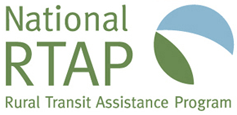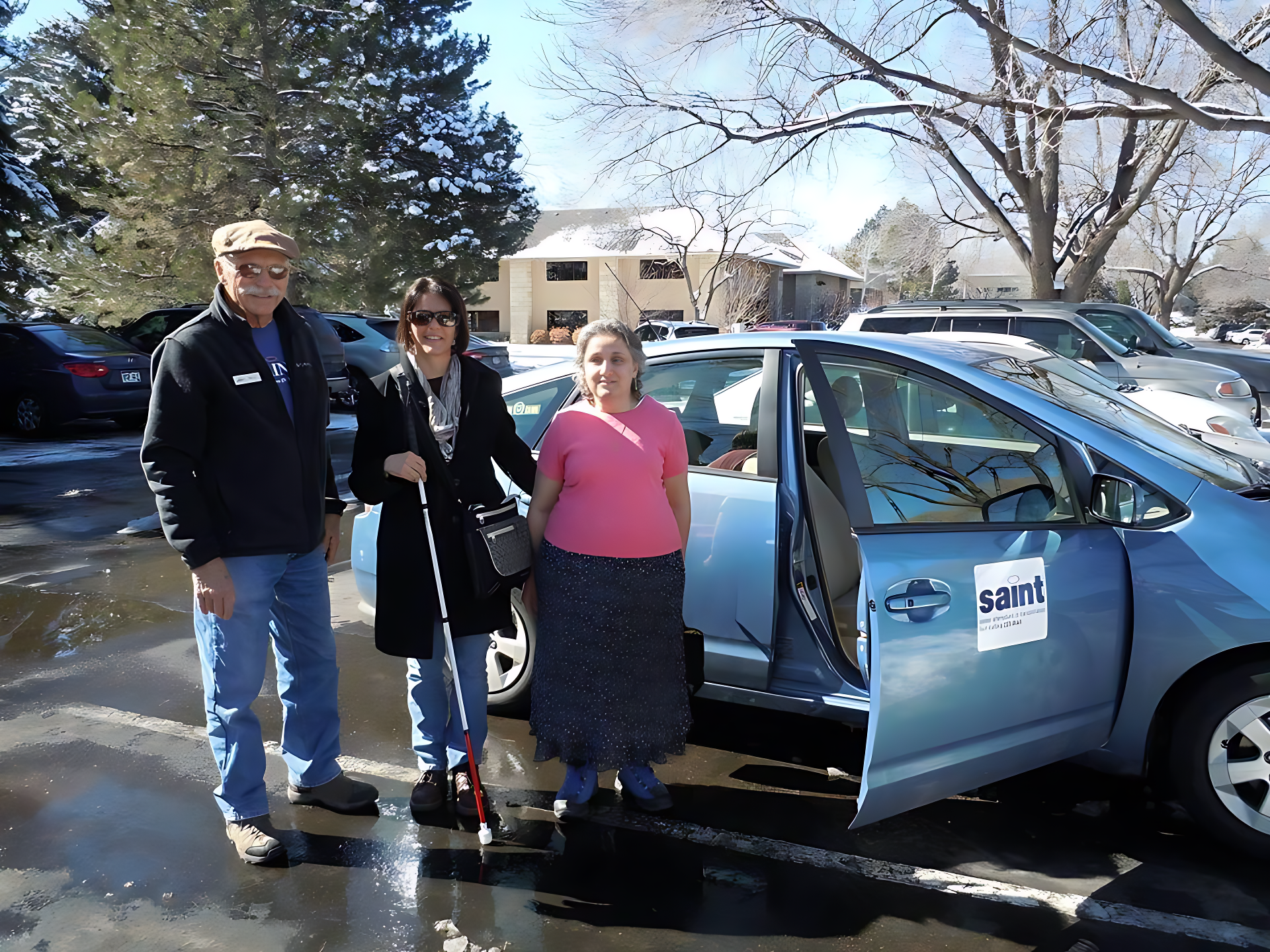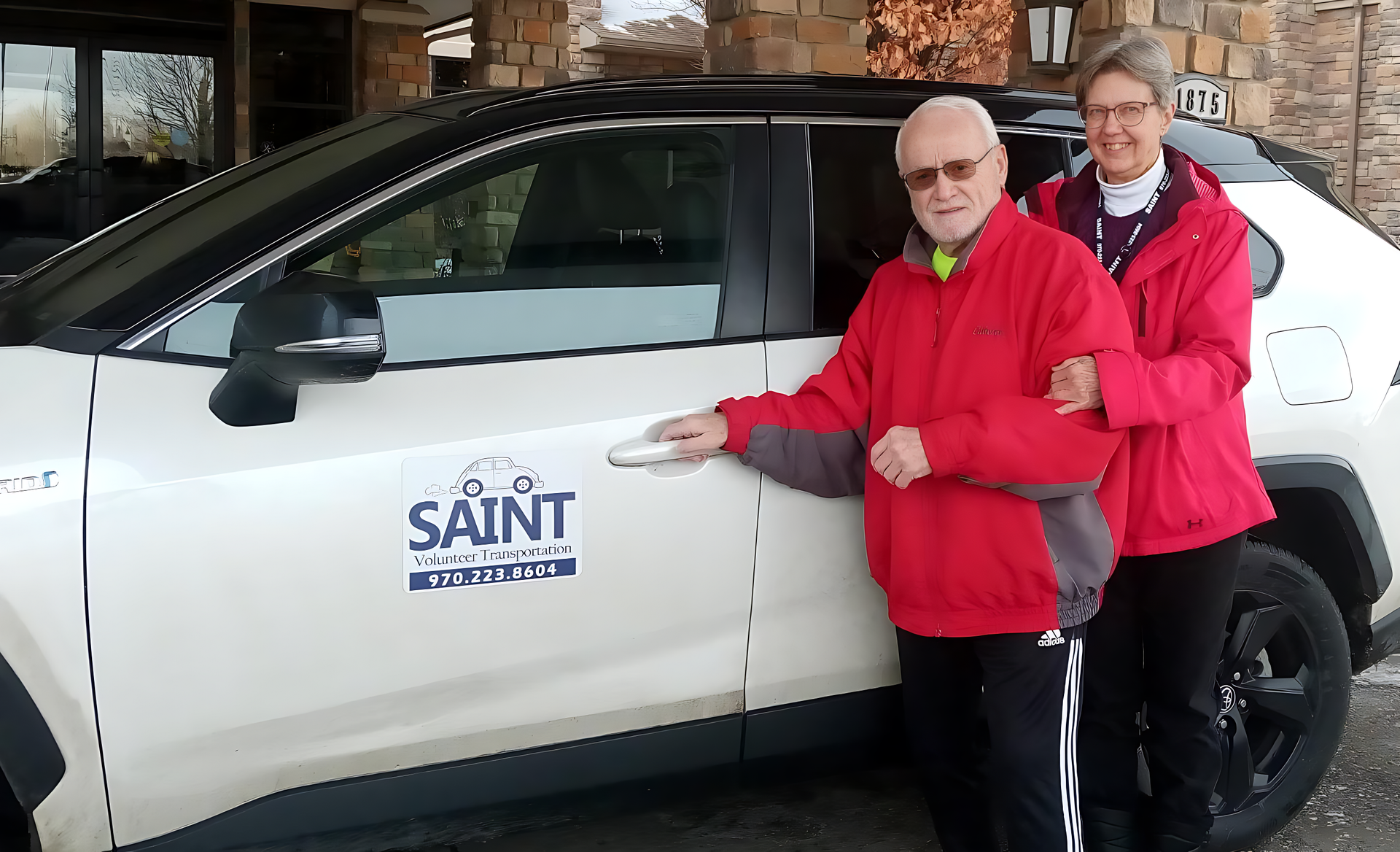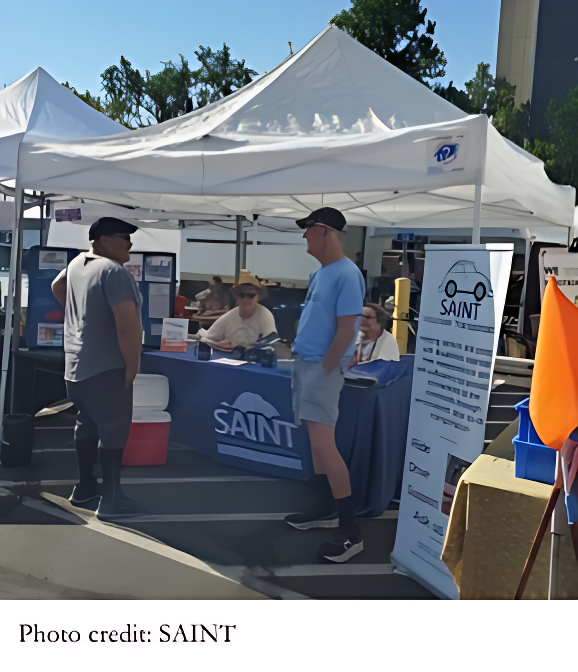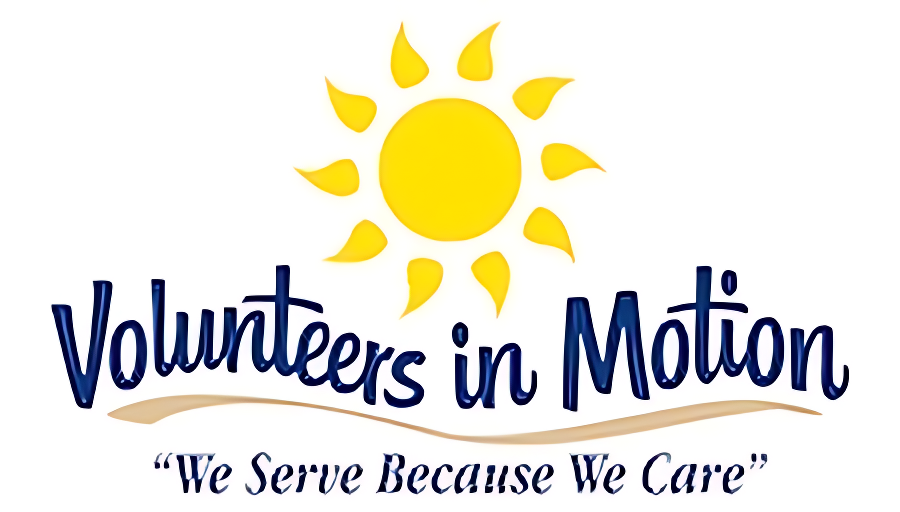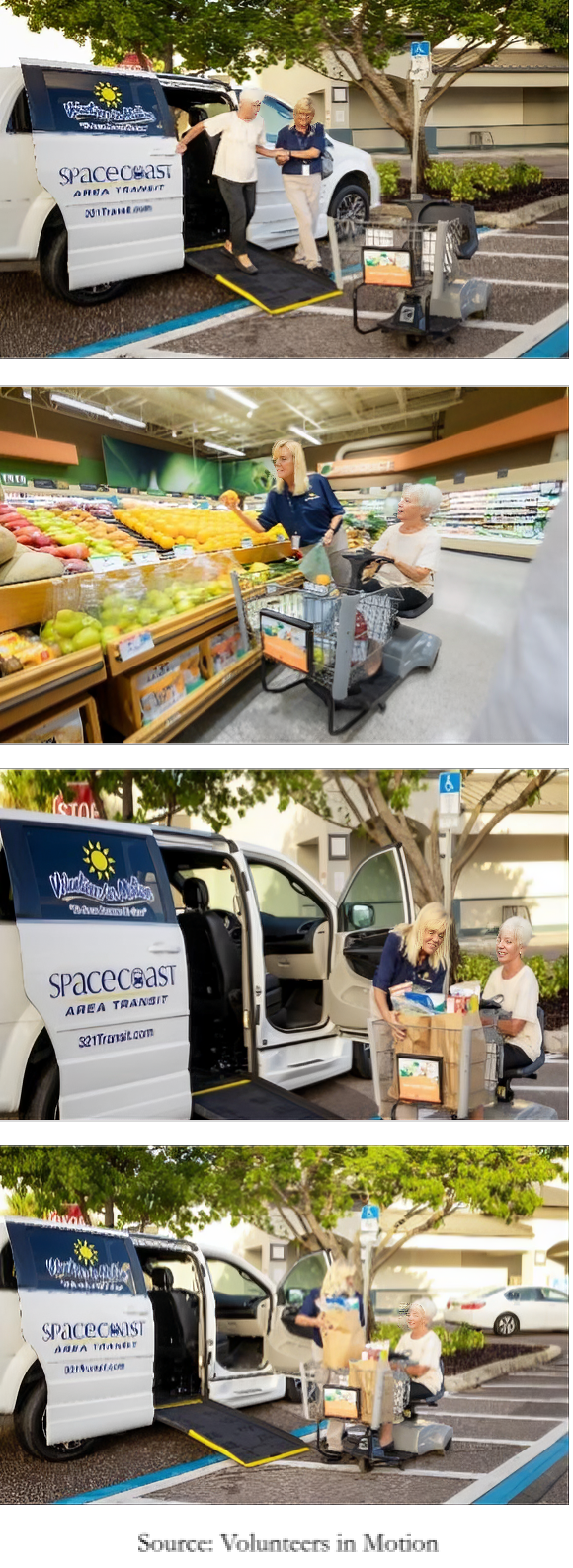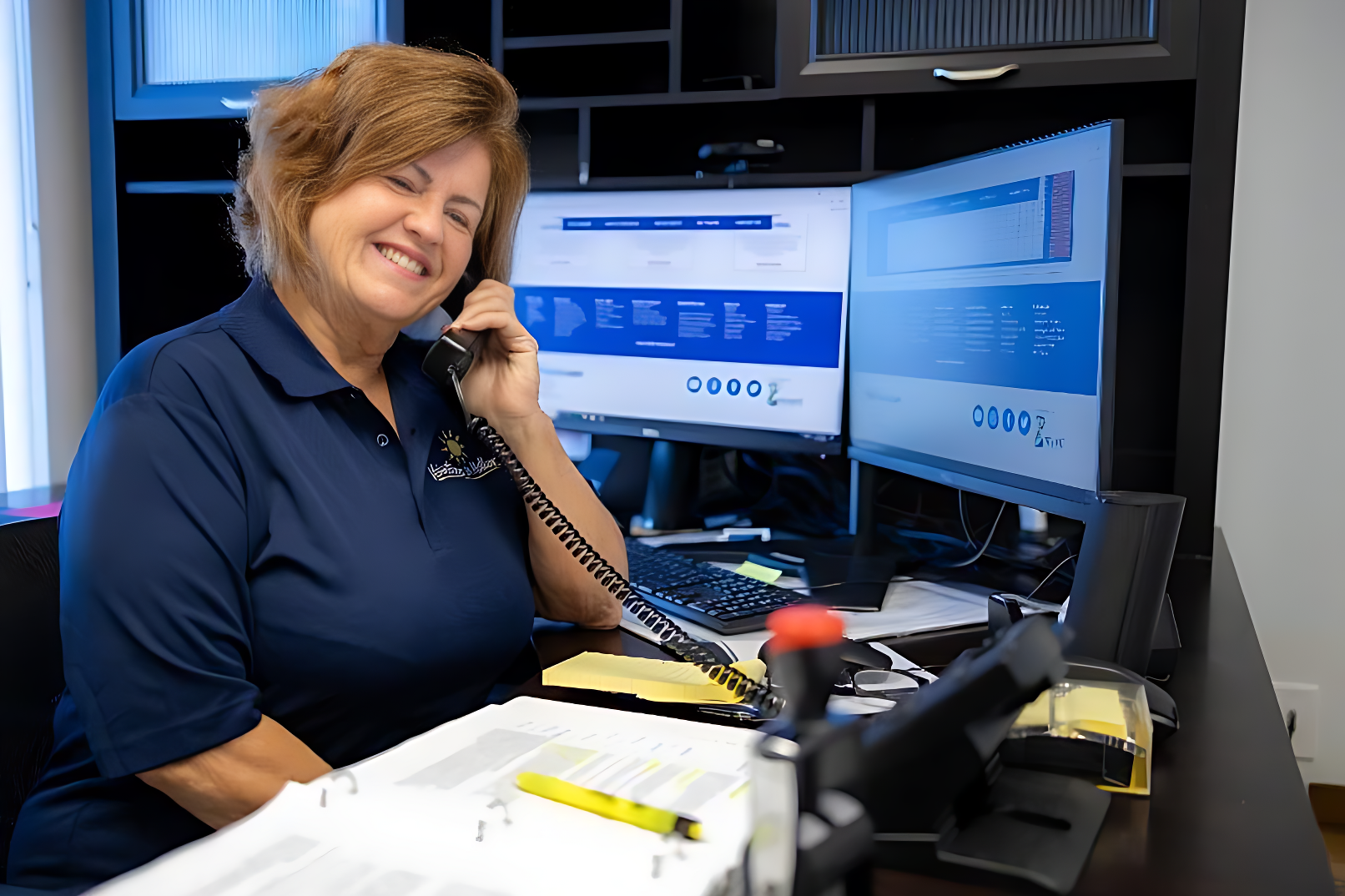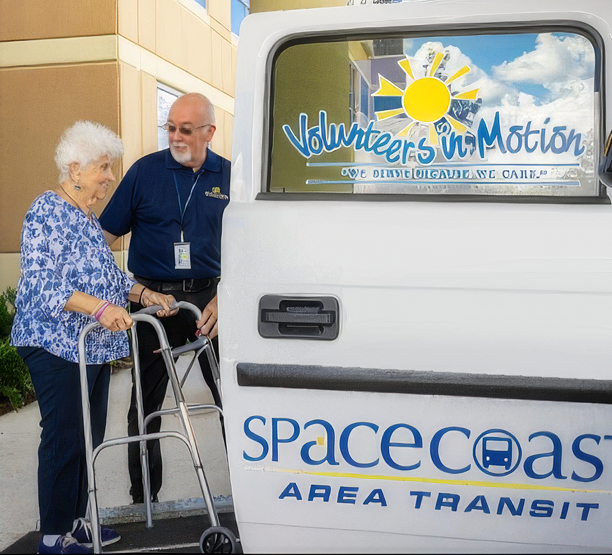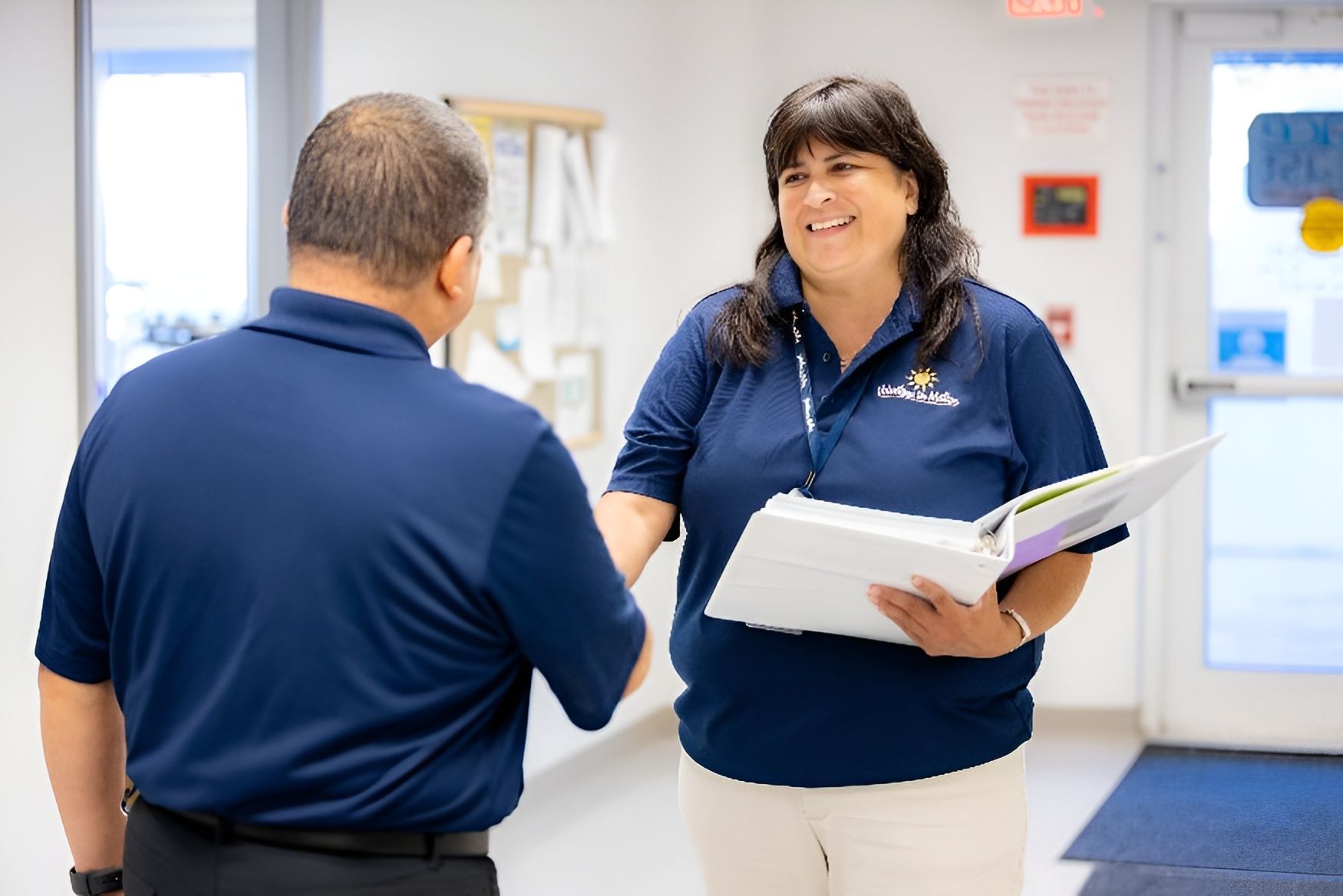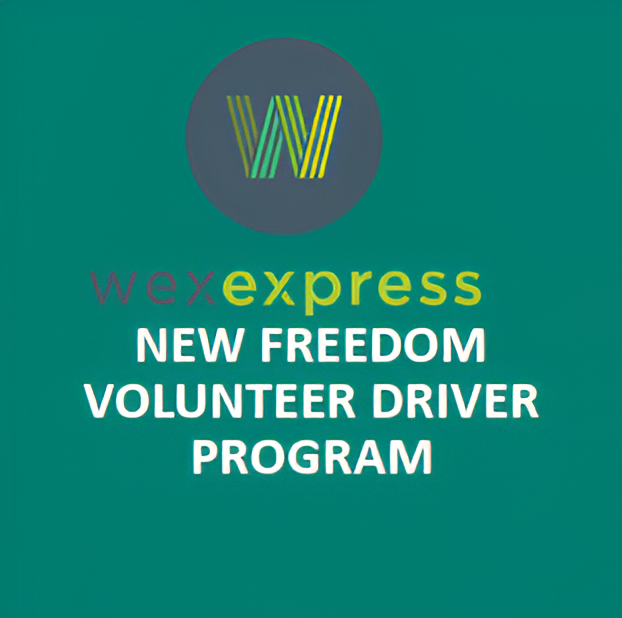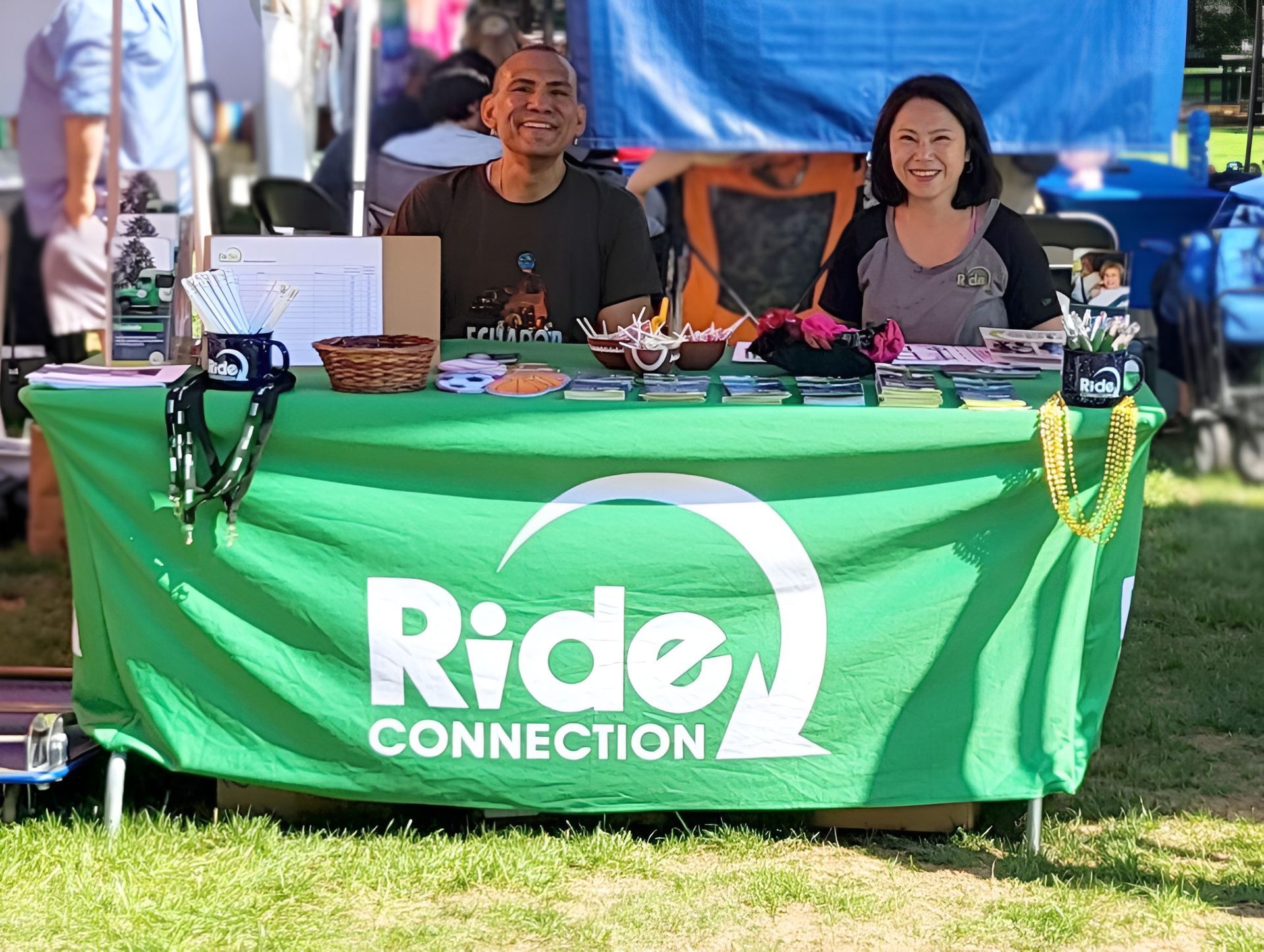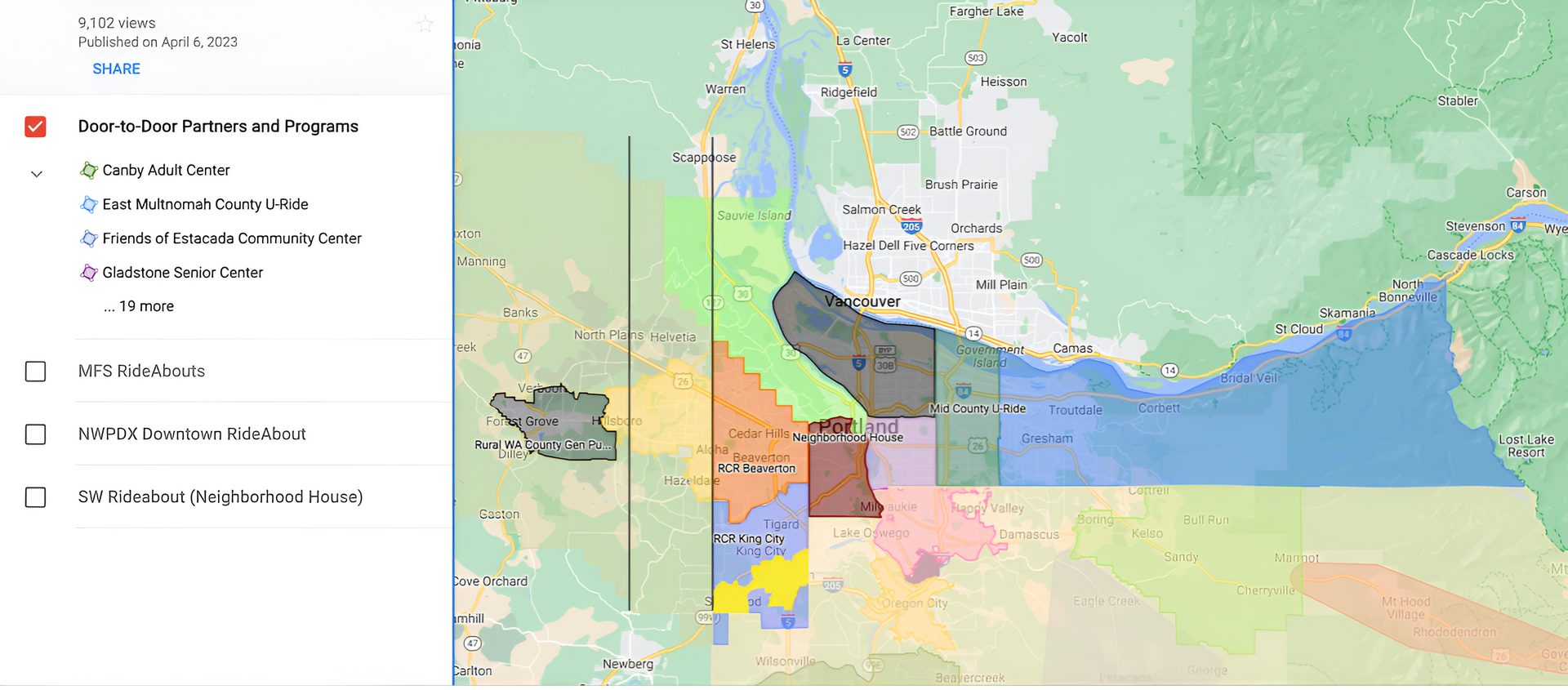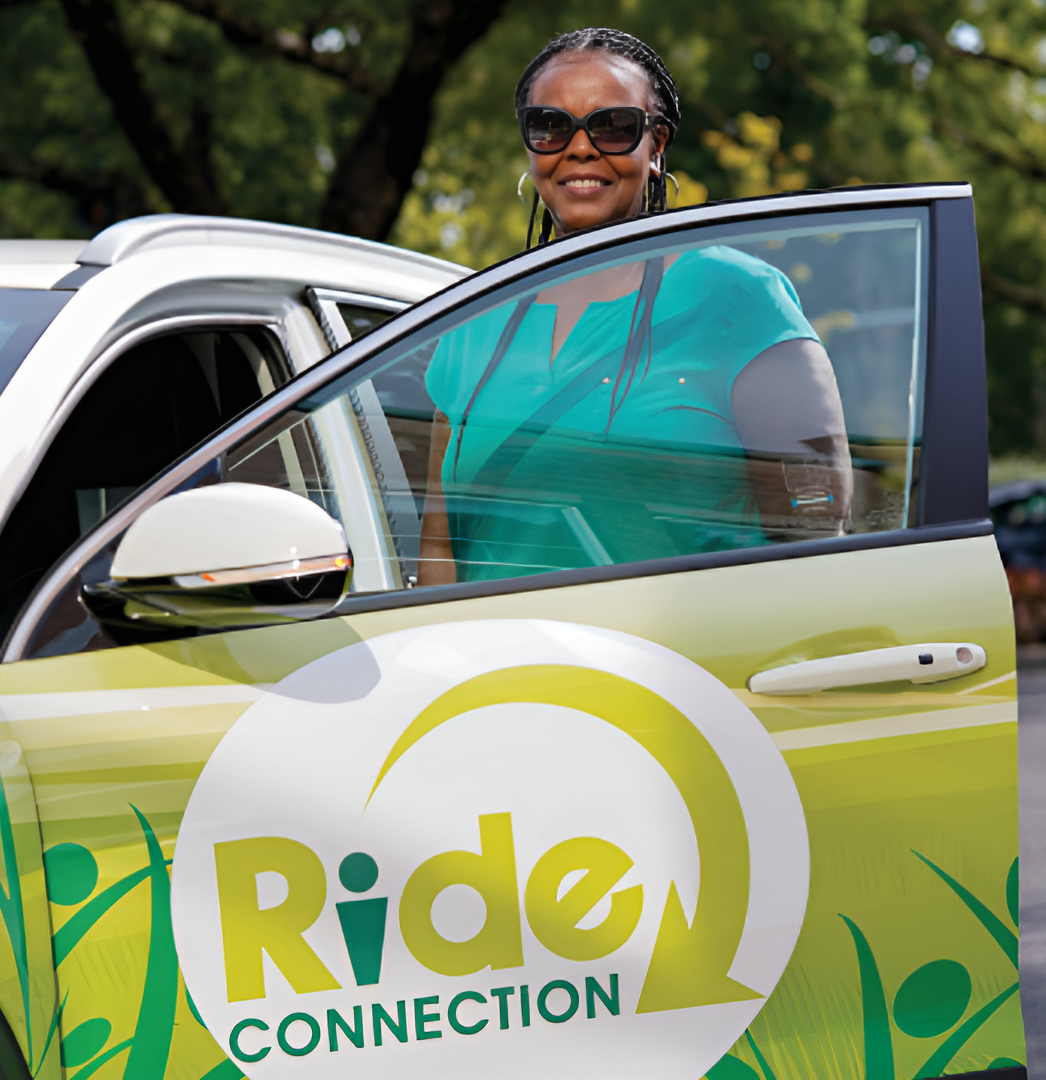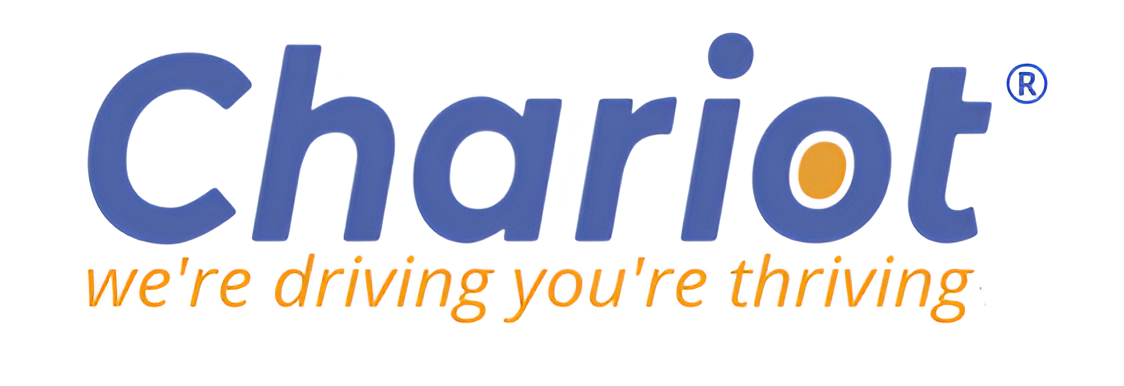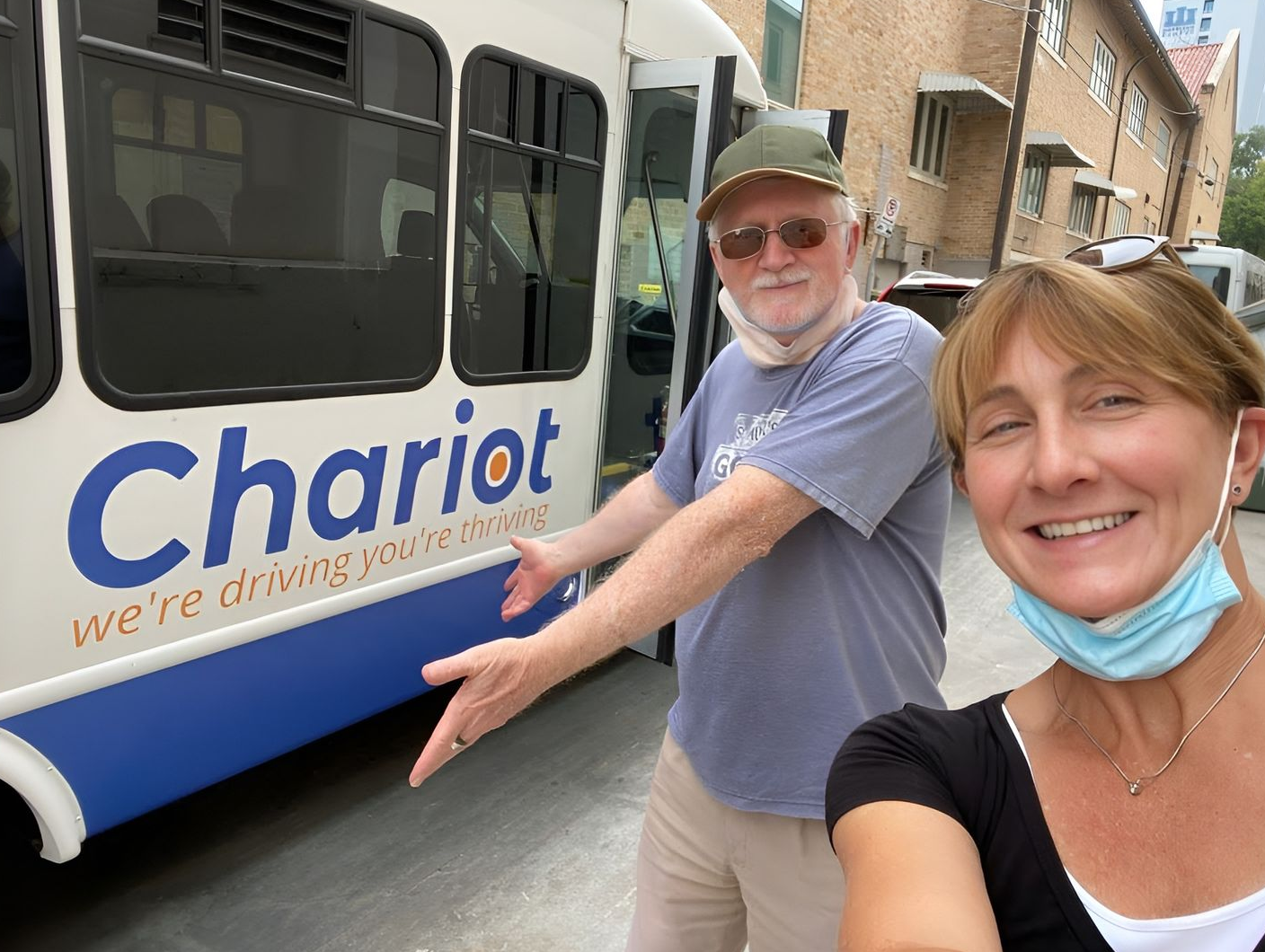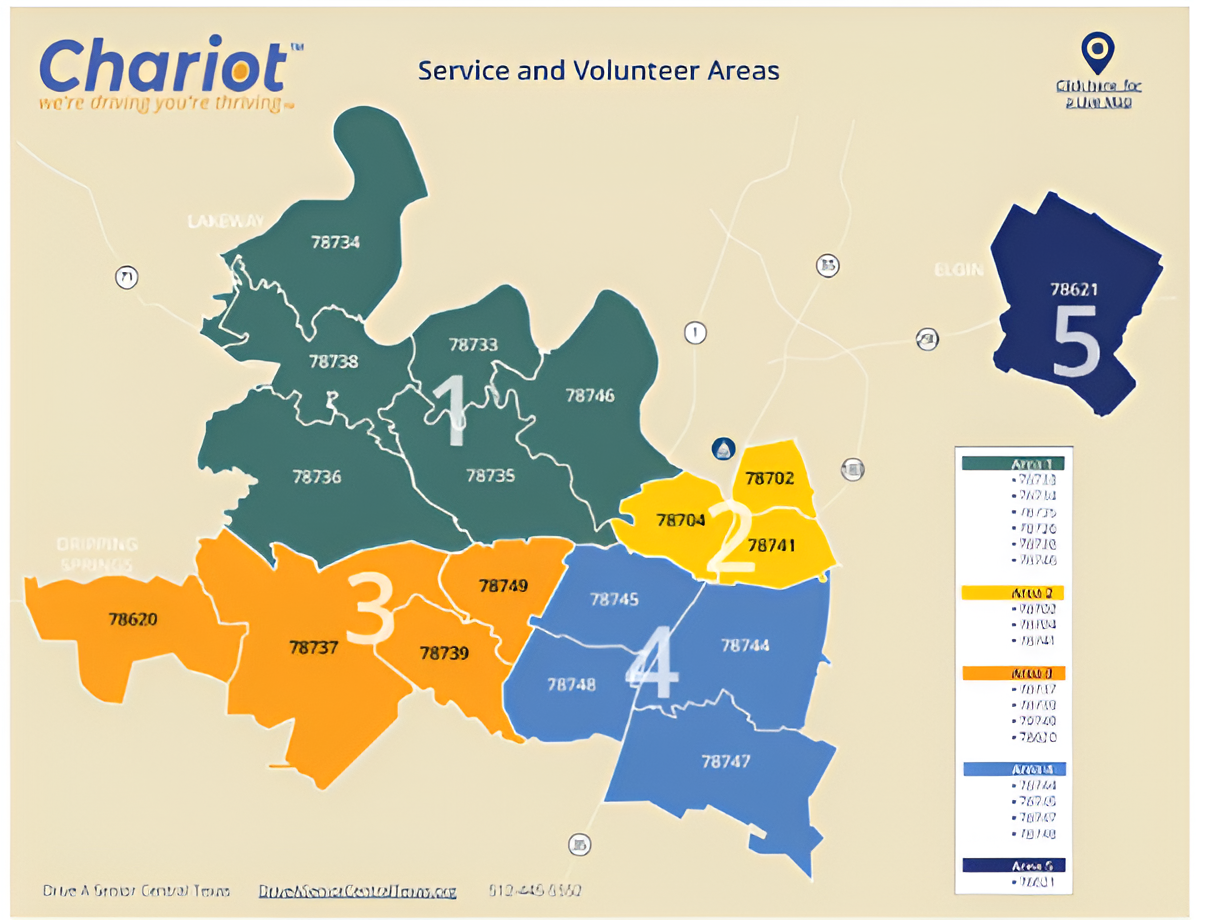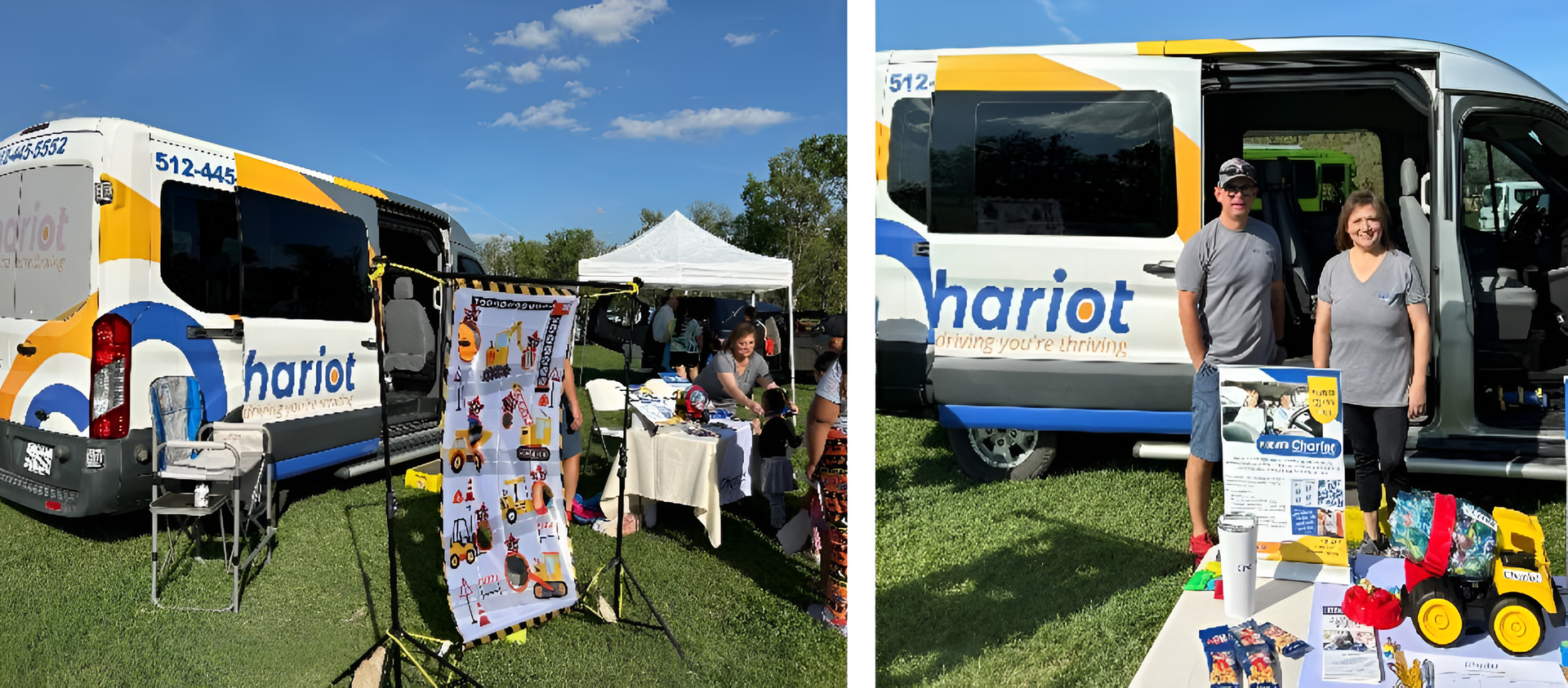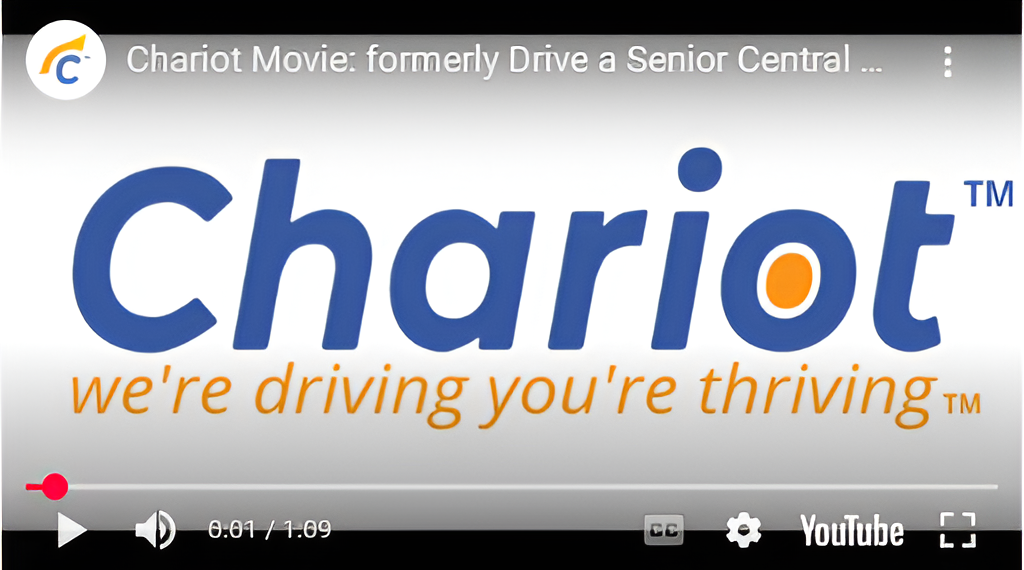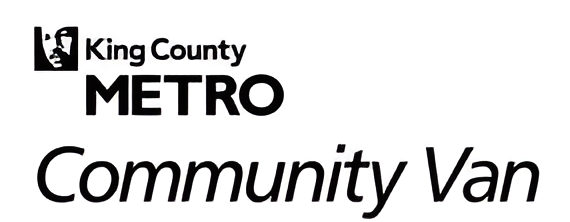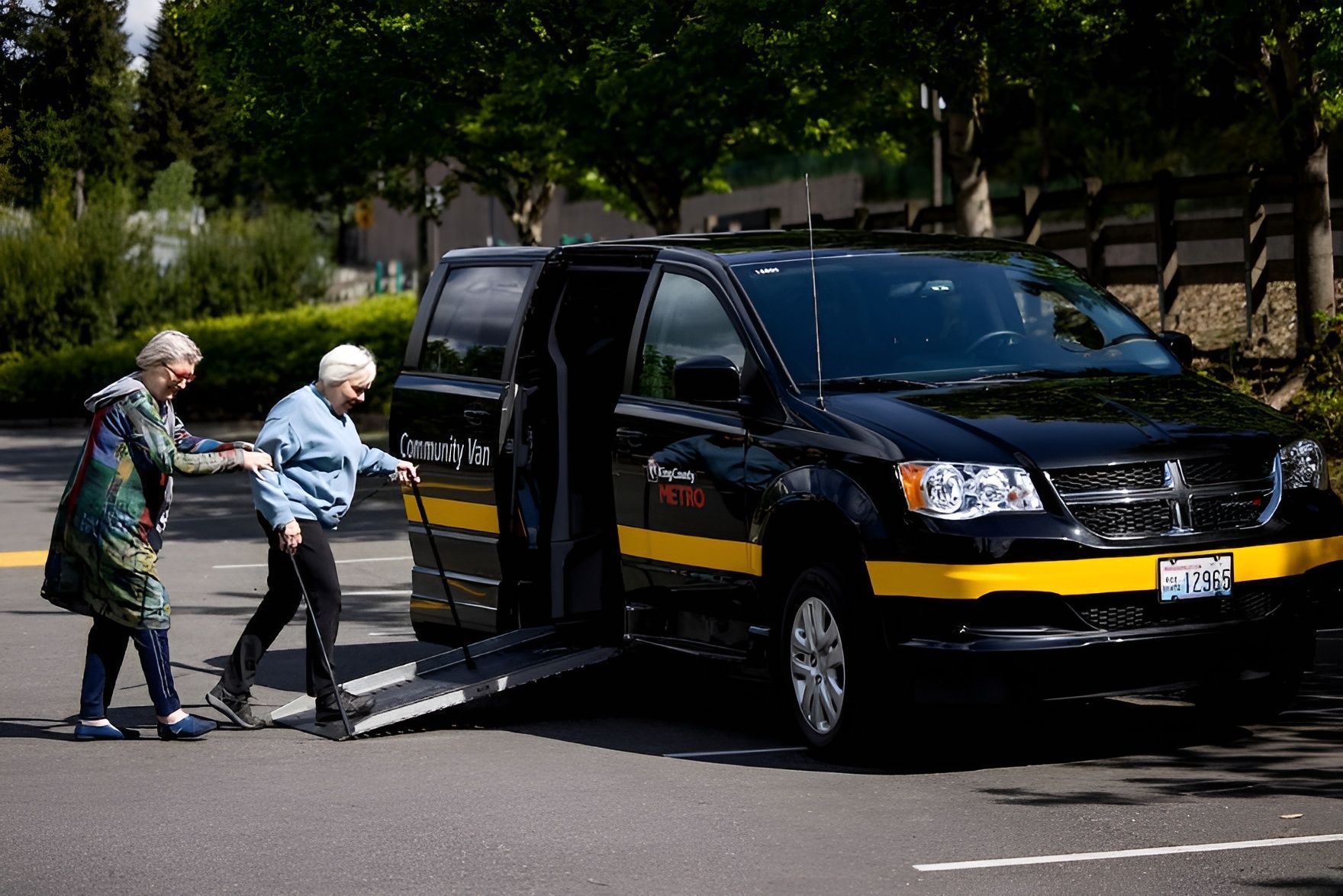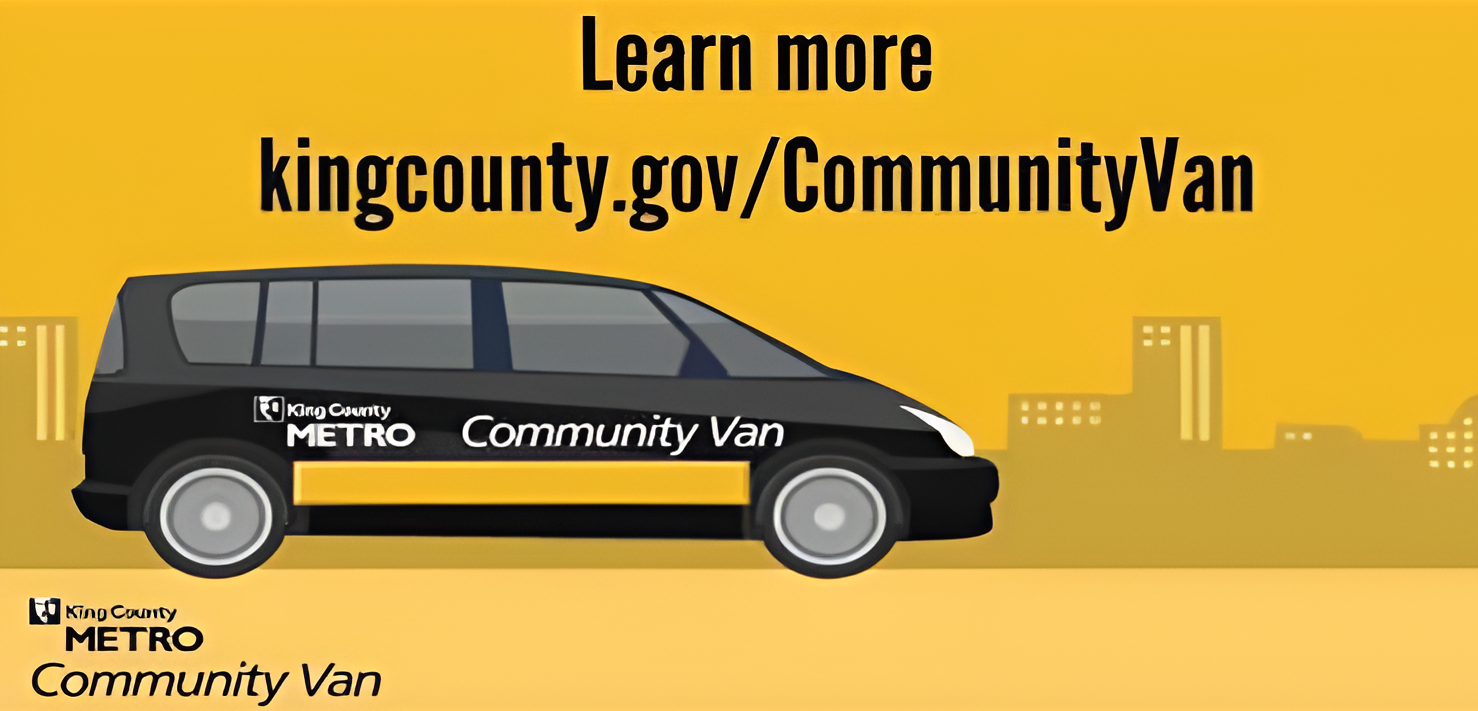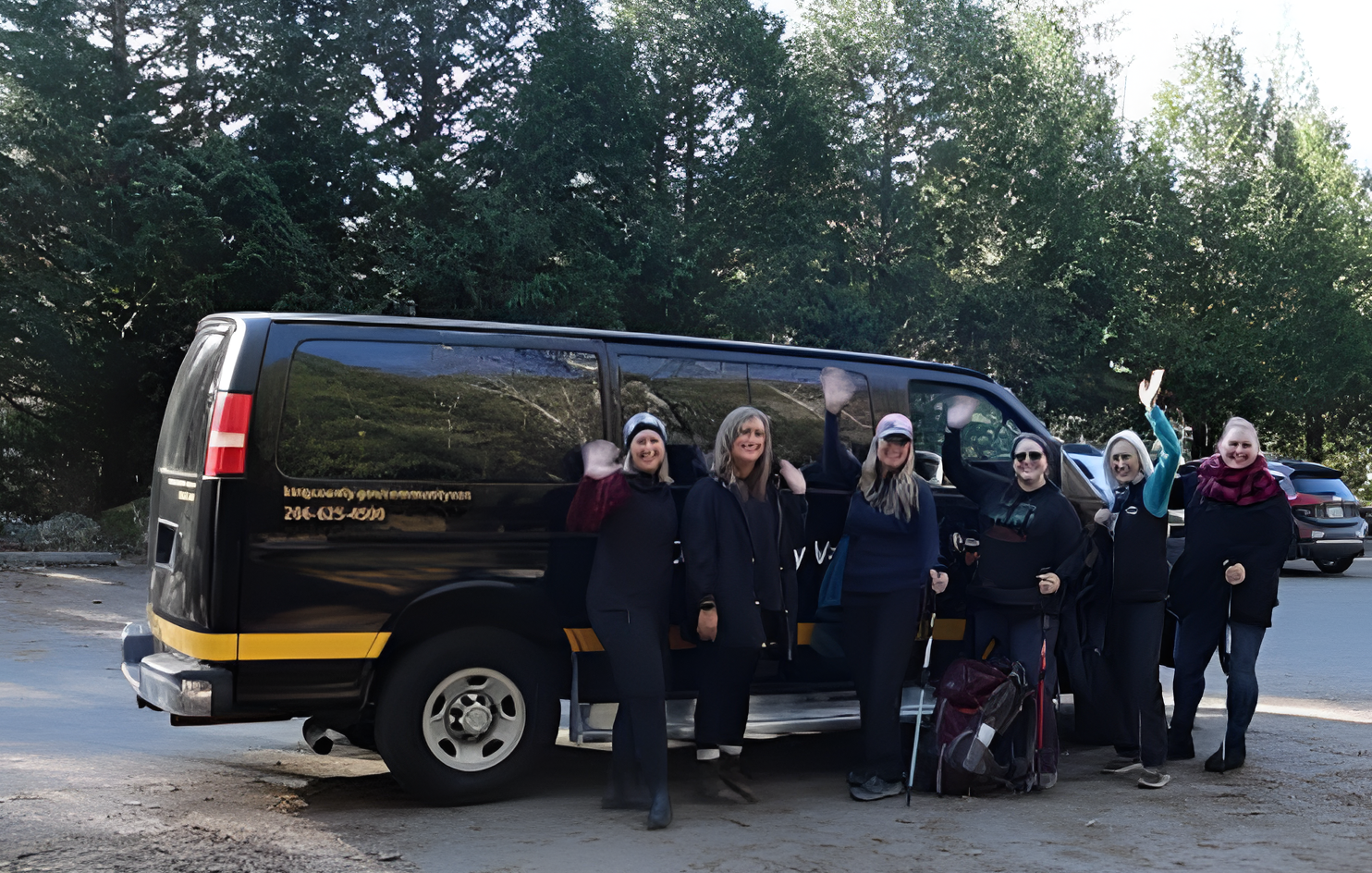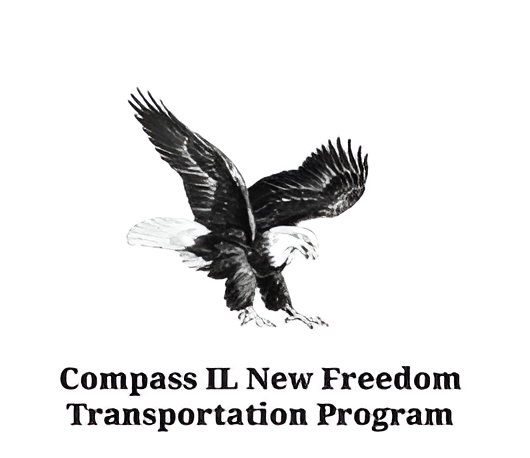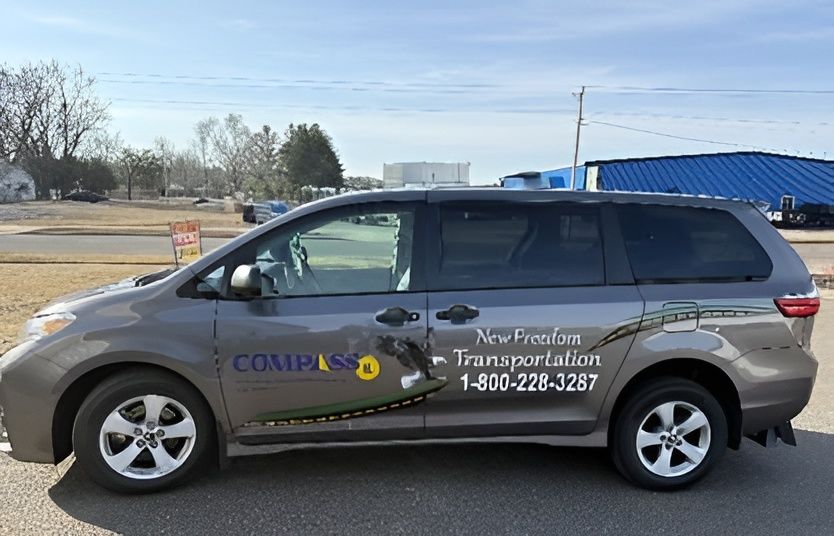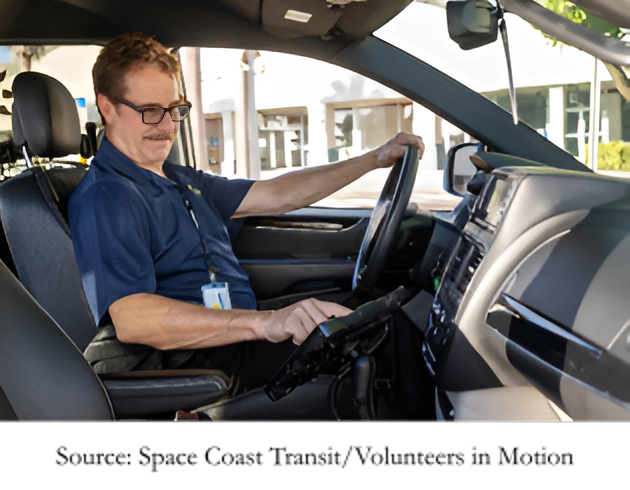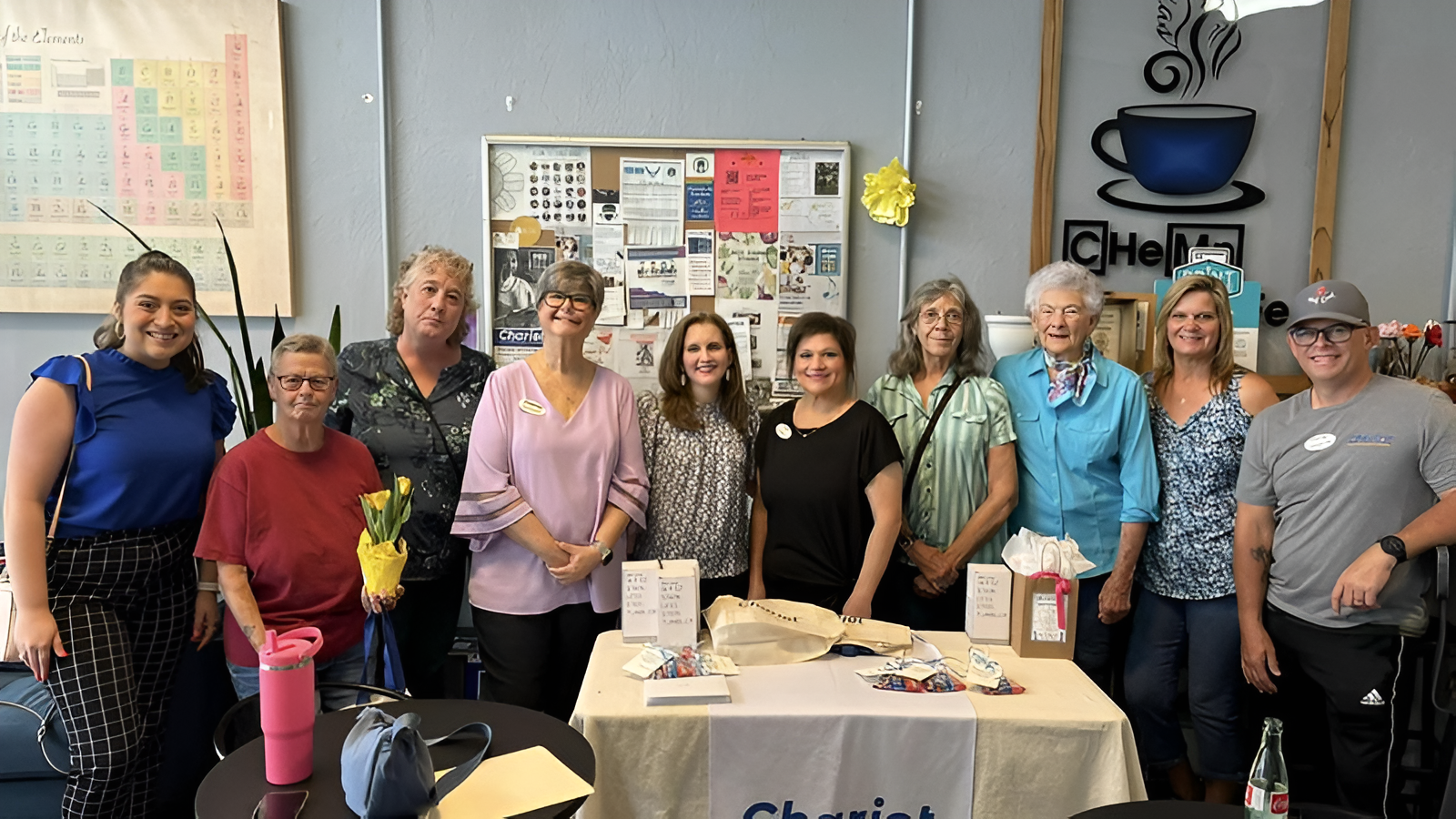Conclusion
Volunteers in Motion continues to be a valuable resource for older adults and individuals with mobility challenges in Brevard County. Through strategic partnerships, dedicated volunteers, and comprehensive support from Space Coast Area Transit, the program remains committed to providing safe, reliable, and compassionate transportation services
Conclusion
Volunteers in Motion continues to be a valuable resource for older adults and individuals with mobility challenges in Brevard County. Through strategic partnerships, dedicated volunteers, and comprehensive support from Space Coast Area Transit, the program remains committed to providing safe, reliable, and compassionate transportation services.
WexExpress New Freedom Volunteer Driver Program, Cadillac, Michigan
About WexExpress New Freedom
The
WexExpress New Freedom Volunteer Driver Program began approximately eight years ago when local groups in Wexford County identified significant transportation gaps affecting older adults and veterans. While Wexford County has a hospital, it lacks specialist care. This means that residents must travel to larger medical centers such as the University of Michigan Hospital in Ann Arbor, located three hours away. In response, Cadillac/Wexford Transit Authority’s (CWTA) executive director sought funding to expand transit services beyond traditional jurisdictional boundaries, enabling statewide transportation when necessary.
The WexExpress New Freedom program experienced a slow start during its first few months. However, once the program gained visibility and volunteers were recruited, demand increased significantly. Presently, the program provides approximately 300 rides per month.
Note: During the COVID-19 pandemic, the program played a crucial role in transporting individuals to dialysis appointments and facilitating older adult and veteran access to COVID-19 vaccinations. As pandemic-related restrictions lifted, demand surged, reaching 600 rides in a single month.
WexExpress New Freedom provides rides to non-emergency appointments across Michigan for people needing transportation assistance and options to locations outside of the WexExpress general operating area.
Program Structure
The WexExpress New Freedom Volunteer Driver Program operates under the WexExpress Mobility Coordination Office, in conjunction with the local transit authority.
The program operates with 15 volunteer drivers who use their personal vehicles. Volunteers use their personal vehicles and receive mileage reimbursement. The program maintains a comprehensive insurance umbrella that includes liability coverage for volunteers, ensuring adequate protection for both drivers and passengers.
WexExpress New Freedom provides approximately 5,000 trips annually. The program has three wheelchair-accessible vehicles, including an MV-1 mobility van, ensuring transportation for passengers with mobility challenges. Passengers are permitted to have an attendant accompany them.
However, there are limitations to the services provided. Drivers are not responsible for passengers post-surgery and are prohibited from entering homes due to insurance constraints. This restriction has presented a challenge for passengers who require additional assistance beyond transportation.
Rider Eligibility
The program does not impose strict eligibility restrictions; however, most passengers are older adults (60 years or older) or veterans. A smaller number of individuals with disabilities, including those receiving services through the Michigan Department of Health and Human Services (DHHS), also utilize the service.
While the program prioritizes partnerships to cover passenger costs, individuals who do not qualify for funding assistance may still use the service if they are willing to cover 50 percent of the transportation cost. The program’s sustainability depends on volunteer drivers, as incorporating paid drivers would significantly increase operational costs and jeopardize financial viability.
Staff
The WexExpress mobility manager, along with a mobility coordinator, manage complex transit trips for riders with special mobility issues. They determine the most appropriate transportation method whether through volunteers, transit services, or external programs for specialized care such as nursing assistance.
Service, Service Area, and Scheduling
The WexExpress New Freedom Program provides transportation services for riders who need transportation options beyond those available by other WexExpress services to get to non-emergent appointments across Michigan.
WexExpress New Freedom trips are scheduled by request only. For individuals with mobility challenges, the organization provides accessible vehicles.
Note: WexExpress provides door-to-door service for all of Wexford County with regular regional connections to Tustin (Oceola County) and Traverse City (Grand Traverse County).
Funding
An
FTA Section 5310 Enhanced Mobility of Seniors and Individuals with Disabilities grant, previously known as a New Freedom grant, covers 50 percent of these costs, while the remaining half is funded through partnerships with local organizations, including the Wexford County Council on Aging, the Area Agency on Aging, Wexford County Veterans Services, and other waiver programs. The Section 5310 grant also covers approximately 75 percent of the mobility manager’s salary.
The Section 5310 grant has been a consistent funding source, secured annually through proper application and compliance. WexExpress successfully qualifies by adhering to the Michigan Department of Transportation’s grant requirements. However, recent decreases in the amount of funding that the state can make available to local transportation programs, like WexExpress New Freedom, pose additional challenges for securing financial support.
Volunteer Drivers
Driver Eligibility
WexExpress Mobility Coordination Office staff conduct background checks, driver’s license verification, and hands-on training, including wheelchair securement procedures. If a driver has difficulty with learning tasks associated with securement, the office’s mobility coordinator provides additional on-the-road training.
Recruitment and Incentives
Volunteer recruitment efforts primarily target older adult and veteran communities through partnerships with the Council on Aging, trade shows, senior expos, networking events, and advocacy groups. Advertisements are also placed in senior center newsletters to attract potential volunteers. Many of the program’s drivers are retirees seeking meaningful volunteer opportunities.
Volunteers receive mileage reimbursement and are recognized during an annual appreciation event, where they are invited to bring a guest. Drivers are acknowledged for their contributions and receive practical gifts related to their work, such as trunk organizers, blankets, and vehicle maintenance supplies. During the COVID-19 pandemic, the program provided safety kits, including wipes, gloves, and hand sanitizer. Additionally, all volunteer vehicles undergo safety inspections conducted free of charge by a local mechanic, who certifies the vehicles as safe for operation.
Driver Training
In addition to the training described above, all volunteer drivers undergo Community Transportation Association of America (CTAA) Passenger Assistance Safety and Sensitivity (PASS) training.
Conclusion
The WexExpress New Freedom volunteer driver program has significantly improved mobility for older adults, veterans, and individuals with disabilities, bridging transportation gaps in Wexford County and beyond.
Additional Resources from WexExpress New Freedom
Ride Connection, Portland, Oregon
About Ride Connection
Founded over 35 years ago as a volunteer-run organization,
Ride Connection emerged from the need to provide mobility services to older adults and individuals with disabilities before the enactment of the Americans with Disabilities Act (ADA). Initially, the program collaborated with senior centers that had wheelchair-accessible vehicles. Over time, it expanded into a comprehensive agency offering multiple transportation services.
Ride Connection's services primarily cater to individuals aged 60 and over or those with disabilities. Programs include volunteer transportation, travel training to teach public transit use, a gas reimbursement program for family caregivers (Ride Together), RideAbout shuttle services for social and shopping trips, and Community Connector fixed-route shuttles filling gaps in city transit. Additionally, the agency offers guided social outings for older adults.
Ride Connection is a network of agencies dedicated to serving older adults, individuals with disabilities, low-income individuals, and the general public with transportation services in Clackamas, Multnomah, and Washington counties. The network provides over 300,000 rides annually and supports more than 2,000 individuals through training and access to public transportation.
Ride Connection’s Mission Statement:
“To link accessible, responsive transportation alternatives with individual and community needs”
Ride Connection, About Us
Ride Connection’s Land Acknowledgement – “Ride Connection acknowledges that our facilities are situated on the traditional village sites of the Multnomah Wasco, Cowlitz, Kathlamet, Clackamas, Bands of Chinook, Tualatin Kalapuya, Molalla, Clackamas, and many other Indigenous nations of the Columbia River, who have called this place home long before the arrival of white colonizers (Portland Indian Leaders Roundtable, 2018). We honor and recognize the enduring relationship between Indigenous peoples and their territories.”
Ride Connection, About Us
Program Structure
Ride Connection manages its volunteer driver program internally. The organization’s volunteer manager works with other outreach team members to recruit and screen volunteer drivers. Volunteers undergo a DMV and background check and comprehensive training before being assigned to program managers based on their location. Program managers oversee daily operations, ensuring volunteers provide service within their respective communities.
The Portland metro area is divided into eight regions, each with designated volunteer ride providers. Ride Connection acts as the "parent" agency, serving as the primary transportation provider in some areas and a supporting agency in others. Volunteer drivers either use their personal vehicles (with mileage reimbursement) or agency vehicles, of which there are approximately 40 available.
The Ride Together program has around 45 volunteers, while the general volunteer driver program has approximately 70 participants. The number of rides provided monthly is managed by operations, with overall services spanning the tri-county area through agency partnerships.
Rider Eligibility
Riders are primarily older adults (individuals 60 years or older) or self-identify as having a disability to qualify for Ride Connection services.
Services, Service Area, and Scheduling
The Ride Connection network offers a variety of transportation options in Clackamas, Multnomah, and Washington counties. Travel option counselors conduct initial intake screenings, gathering information on mobility needs to match individuals with appropriate services. Ride Connection offers door-to-door assistance and helps manage ride cancellations through automated reminders and subscription ride services.
Most services are available Monday through Friday. The hours, availability, and days of service may vary.
Riders are asked to schedule rides at least four business days in advance. Established customers can request an online account to request rides via the Ride Connection website.
Funding
Ride Connection receives funding from a combination of public and private sources, including:
- Private Funding: Grants from healthcare organizations such as Providence Healthcare, Legacy Health, and Care Oregon
Volunteer Drivers
“Why volunteer? The simple act of getting someone where they need to go can be an incredibly rewarding experience. We rely on caring and compassionate volunteer drivers to provide valuable rides to the people in our community who need it most.”
Ride Connection’s Volunteer Website
Volunteers can drive their own vehicle or an agency-owned vehicle. Requirements for volunteer drivers include:
- A valid driver’s license and 5+ years of driving experience.
- Completing our volunteer application and interview process.
- Ability to pass a criminal background and DMV check.
- Completing training courses provided by Ride Connection (available in classroom or online).
Driver Recruitment and Incentives
Driver recruitment efforts include outreach fairs, presentations at senior centers and civic organizations, newspaper ads, public radio station advertisements, and word-of-mouth referrals.
- Mileage reimbursement for personal vehicle use
- Defensive driving courses that may lower insurance rates
- Volunteer appreciation events
- Many volunteers serve without expecting additional incentives, motivated by the impact of their work
Note: Despite past volunteer numbers nearing 200, the COVID-19 pandemic significantly reduced participation, and the program is currently rebuilding its volunteer base.
Driver Training
Ride Connection offers a structured training program for volunteers, including:
- Defensive driving (in-house)
- Best Ride (customer service skills)
- Bloodborne pathogens training
- Road testing with training staff
- Additional wheelchair securement training for drivers of accessible vehicles
Conclusion
Ride Connection continues to evolve, providing essential mobility services to underserved communities while fostering a dedicated network of volunteer drivers.
Additional Resources from Ride Connection
About Chariot
Chariot, formerly known as Drive a Senior Central Texas, has been involved in transportation services for older adults since 1988. Sister Madeline Sophie Weber, faculty member of St. Edward’s University in Austin, Texas, and a graduate student began as South Austin Caregivers with volunteers providing transportation to church and grocery stores.
In 2019, the organization rebranded Drive a Senior Central Texas (DASCTX) and expanded its service area to include South Austin, Southwest Austin, Lakeway, northern Hays County, and Elgin. The current organization is the result of three mergers, with the legal name Drive-A-Senior Central Texas, doing business as (DBA) Chariot.
In 2021, the Chariot’s board opted to rebrand the service as Chariot,
We’re Driving You’re Thriving to minimize confusion. The organization currently collaborates with three other Drive-A-Senior groups to serve underserved neighborhoods and rural areas more effectively.
Chariot’s history is available in much more detail on the organization’s website.
Chariot is a volunteer driver program that provides individual rides for non-driving older adults (60 years or over) for medical appointments and grocery shopping. Service is available Monday to Friday if a volunteer is available. Trips can be one-way or round-trip.
- Chariot’s Mission Statement – “Chariot enriches lives and communities by providing transportation and socialization to non-driving older adults, helping them to age in place.”
Chariot, About Us
Program Structure
Chariot is a 501(c)(3) nonprofit organization and one of five entities in Central Texas providing essential, free transportation services for older adults. Chariot has a ten member Board of Directors. Its administrative staff includes an Executive Director, Finance Manager. Special Project Coordinator, and a Project Assistant. Program staff include two Service Coordinators, a Site Manager, and six Bus/Van Drivers.
The program follows a volunteer-driver model, actively recruiting individuals to transport older adults (60 years or older) who are no longer able to drive. Services cover essential needs such as medical appointments, dental visits, grocery shopping, and voting.
Service Breakdown:
- 50 percent of rides are provided by volunteer drivers.
- 24 percent of rides are handled by paid staff drivers.
- 25 percent of rides are facilitated through Lyft and micro-transit services.
The current driver-to-client ratio is one volunteer per two clients, highlighting the need for additional volunteers to ensure sustainability. Volunteer recruitment has not yet returned to pre-pandemic levels.
Vehicle Fleet:
The organization operates a fleet of seven vehicles, including four passenger vans (each seating up to 15 people, similar to hotel shuttle vans) and three SUVs (Jeep Cherokee and Ford Escape, and Toyota Sienna) designated for passengers with special needs. Chariot was recently selected by a church partner for fundraising efforts to acquire a new SUV (Toyota Sienna). However, none of the vehicles, including those used by third-party services, are wheelchair-accessible vehicle (WAV). If a client requires a WAV vehicle, they are referred to
CapMetro, Austin’s regional public transportation provider.
Rider Eligibility
Chariot serves adults who:
- Are age 60 and over
- Are non-driving or limited driving (feel uncomfortable driving)
- Live in their own residence or live in a senior living community where they do not have access to transportation services
- Live within the boundary of Chariot’s service area which is currently comprised of 18 zip codes
- Are able to walk on their own or with walkers or canes (volunteers cannot transport wheelchairs or lift clients in any manner)
- Riders must own and carry a cellular phone to maintain contact with volunteers and staff while using Chariot Services for transportation
Prospective clients can register independently or through a family member. A completed client packet is required. For those needing a ride within 30 days of enrollment, Chariot prioritizes their request and requires a signed waiver.
Chariot has experienced continuous monthly growth in rider enrollment. To manage this increasing demand, the organization now tracks only completed applications to prioritize service delivery.
aividual Rides - Chariot provides free door-to-door service, if a volunteer is available. Ride requests can be one-way or round-trip. Clients must call in their ride requests at least 7 days in advance. Ride requests are taken Monday through Friday 8 AM – 2 PM.
Operating Hours:
- Monday through Friday: 8 AM – 4 PM
- Last ride requests are taken at 4 PM to allow volunteer drivers adequate time to return home.
Community Rides
- Chariot provides group transportation services using vans to various destinations including grocery stores, shopping centers and other places of interest to the riders. Additionally, special “field trip” rides allow individuals to register in advance for outings to thrift stores and other locations. These rides originate from both residential locations and community centers, with the van in Elgin specifically picking up from the senior center.
Third-Party Transportation:
When volunteer or staff drivers are unavailable, Chariot utilizes third-party services such as Lyft and ZTrip, with Lyft being the primary provider. In urgent situations, such as a same-day medical appointment, third-party rides are used. The costs associated with these rides are absorbed by ZTrip as a subrecipient of Capital Metro/CAMPO, with 70 percent of third-party rides eligible for reimbursement.
Service Area -
Chariot operates across 18 zip codes, covering a total of 630 square miles—approximately twice the size of Austin proper. The organization serves communities in Travis County, Hays County, and the city of Elgin.
Funding
Volunteer Drivers
Volunteer drivers use their own cars to provide door-to-door rides to medical appointments, grocery stores, hair appointments, pharmacies, banks, activity centers, support groups, and other errands. Typically, a round trip takes 2-3 hours; a one-way drop off is about an hour.
- Be 21 years of age with a high-school diploma or equivalent.
- Provide a valid driver’s license and car insurance.
- Pass background and driver record checks.
- Attend a brief orientation and training session.
- Commit to completing at least one ride per month.
The onboarding process for new volunteers is relatively straightforward, requiring proper documentation, a phone interview, a background check, and a 30-minute orientation. Instruction is also provided on how to access Chariot’s online platform which allows volunteers to select rides to fit their own schedules. Rides can be set up by phone or email.
Data indicates that 38 percent of volunteer drivers have yet to complete their first ride, likely due to apprehension about transporting unfamiliar passengers. To address this, there are considerations to implement an incentive program where new drivers accompany experienced volunteers on initial trips.
Note:
The COVID-19 pandemic led to a significant reduction in volunteer drivers due to health and safety restrictions. While service resumed post-pandemic, efforts to recruit new volunteers have been limited.
Driver Recruitment and Incentives
Recruiting new volunteer drivers is an ongoing challenge. Chariot is exploring ways to enhance engagement, including targeted outreach efforts.
Photo credit: Chariot (Touch a Truck Event 2024, Elgin, Texas)
In November 2024, Chariot ran a half-page advertisement in the Austin Business Journal’s Giving Guide. A similar advertisement will appear in the
Austin Business Journal’s Book of Lists next year.
Chariot also collaborates with
Mission Capital, a local nonprofit organization that provides board training and best practices. This partnership aims to develop a structured approach to volunteer recruitment.
Chariot recently signed a partnership agreement with
engAGE Travis County to provide up to $25.00 in mileage reimbursement for registered volunteer drivers over 50 who drive at least 125 miles each month.
Driver Training
At present, Chariot provides a brief virtual training for its volunteer drivers. Upon completion of this training session, volunteer drivers can begin driving for clients. The need for a formal in-person training program is under consideration, and future initiatives may focus on training and operational optimization. The organization’s primary focus remains on enhancing service efficiency and fundraising efforts.
Conclusion
Chariot has a rich history in the Austin area. The organization has been able to successfully expand its service area to include South Austin, Southwest Austin, Lakeway, Dripping Springs, Northern Hays County, and the City of Elgin. Their expansion into underserved neighborhoods and rural areas has resulted in a more impactful and efficient program.
Additional Resources from Chariot
About King County Metro (Metro) Community Van
King County Metro (Metro) Community Van program was initially developed as a pilot demonstration project in 2016 in response to an identified need for areas of the county where land use, population density or topography and infrastructure is not compatible with traditional fixed route expansion or in areas where fixed route service has been reduced due to low ridership or other factors. Designed to offer flexible and customized transportation options, the service supports travel needs in areas where traditional bus service may not be available.
The program actively partners with nonprofits serving Black, Indigenous, People of Color (BIPOC), immigrant and refugee populations, individuals with disabilities, limited-income households, and those with language access needs. These relationships support inclusive service delivery, offering in-language trips, flexible scheduling, and access to destinations beyond the fixed-route network. King County Metro remains committed to addressing the evolving transportation needs of King County’s diverse and growing population.
The
Metro Community Van (Community Van) Program is a reservation-based, rideshare service that is a volunteer-driven transportation service. Dependent on volunteer driver availability, trips can occur 24 hours a day, seven days a week. Eligible trips must begin in the city the van is assigned to and may not be greater than a two-hour distance of the van’s pickup location and be completed on the same day. Community Van currently operates in 18 cities and unincorporated areas throughout King County, with vans strategically placed to ensure accessibility and ease of use for residents across the region.
Photo credit: King County Metro Community Van
Mission Statement –
King County Metro (Metro) King County Metro’s mission is to provide the best possible public transportation services and improve regional mobility and quality of life.
Community Van reflects Metro’s commitment to meeting King County's evolving transportation needs by bridging service gaps, promoting equity, and offering flexible, community-driven options. The program advances Metro’s broader goals of sustainability, accessibility, and inclusive mobility, as outlined in the
King County Metro Strategic Plan.
Program Structure
King County Metro provides the vehicles, fuel, insurance, and program oversight, including volunteer driver training and safety monitoring. Individuals aged 21 and over with a valid Washington State driver’s license who meet the program’s eligibility criteria may apply to serve as volunteer drivers. All drivers must complete the required training before conducting their first trip. Community Van currently operates in 18 cities and unincorporated areas throughout King County, with vans strategically placed to ensure accessibility and ease of use for residents across the region.
King County Metro contracts with local community partners in participating jurisdictions who have strong community ties to support the delivery of the Community Van program. Metro funds a 0.50 Full-Time Equivalent (FTE) Community Transportation Coordinator (CTC) in each jurisdiction.
Partners include the University of Washington Bothell Campus, City of Bothell, Woodinville, Kirkland, Algona, and the Vashon Chamber of Commerce. Where local partners are unavailable,
Hopelink is the contracted provider that supports five jurisdictions. Some partners combine Metro funding to support full-time staff, while others maintain a dedicated part-time CTC role focused solely on Community Van operations.
CTCs handle the day-to-day coordination of the program, including outreach, relationship building, volunteer driver recruitment, trip planning, vehicle scheduling, fare collection, and reporting. They also collaborate with Metro on vehicle maintenance and promote the program through local events and community engagement.
Rider Eligibility
Community Van is open to all members of the public for non-commute group trips ranging from two to eleven passengers. There are no age or income restrictions; however, youth under 13 must be accompanied by an adult.
By eliminating eligibility barriers and not requiring proof of need, Community Van ensures equitable access to transportation. Ride requests are accommodated on a first-come, first-served basis.
Services, Service Area, and Scheduling
Services
- Community Van provides shared, non-commute group rides to destinations throughout the day, evenings, and weekends. Vans are available 24/7 if vehicles and volunteer drivers are available.
Fare Structure:
- $2.70 per general rider
- $1.00 per senior rider
- Youth - Youth 18 and under ride for free.
Riders must follow child seat laws and submit a child rider agreement for unaccompanied minors.
Service Areas - Each trip must originate in the jurisdiction the van is assigned to, though additional riders may be picked up along the route. See the complete list of jurisdictions in
Program Structure above.
Trip distance - Trips may extend up to two hours from the origin point and must be completed on the same day. Eligible trips must begin in the city the van is assigned to and may not be greater than a two-hour distance of the van’s pickup location and be completed on the same day; overnight travel is prohibited.
Scheduling - Trip requests are submitted via phone or email to the local CTC or through the Schedule a Ride Request Form, where available. Requests that fall outside standard criteria are reviewed case-by-case by the program manager.
Trips must be pre-scheduled with the CTC in the assigned jurisdiction at least two business days in advance. All trips must begin and end within the same jurisdiction.
Riders may request one-time or recurring trips, join existing rides if space is available, and coordinate minor route adjustments through the CTC.
Funding
The program is fully funded by King County Metro through local and state resources under the public transit budget. Community Van partners with cities and transit stakeholders, who benefit from contractual funding for CTCs, which supports staffing, coordination, and local outreach efforts.
Volunteer Drivers
Volunteer drivers must be at least 21 years old and hold a valid Washington State driver’s license. Applicants must meet King County Metro’s driver eligibility criteria and complete the required training before their first trip. Prospective drivers should allow approximately two weeks for the application, background check, and training process to be completed.
Recruitment and Incentives
Volunteer Recruitment - Volunteer recruitment is conducted through social media, community partners, and word-of-mouth. CTCs join in community events and activities to promote the service and other Metro transit options available in the community. Metro launched guides in 2021 to support new riders and drivers.
Volunteer Incentives - Each partner celebrates volunteers in a variety of ways such as group celebrations, small tokens of appreciation, and volunteer recognition on social media for their contributions.
Driver Training
Volunteer Driver Training Includes:
- Accessible Equipment & Disability Awareness (AEDA) Training - Hands-on, in-person course covering vehicle equipment, accessibility, and passenger assistance.
- Wheelchair Securement Training - Required component of AEDA focused on safely transporting passengers using mobility devices.
- Online Orientation - Program expectations, procedures, and safety guidelines overview.
Conclusion
King County Metro’s Community Van Program continues to address transportation gaps with innovative, community-led solutions. With Metro’s support, the dedication of CTCs and volunteers, along with the valued relationships built with community members and organizations, the program enhances mobility and access across King County.
What sets Community Van apart is its human-centered, unique approach of neighbors helping neighbors. Whether it’s a volunteer driver taking a senior to a medical appointment, a family visiting a local festival, or a group of teens heading to a community center, each trip tells a story of connection and care. These everyday moments reflect the power of shared rides in building stronger, socially rich, and more inclusive communities.
Looking ahead, Community Van remains a vital part of King County’s vision for equitable, accessible, and sustainable transportation, delivered not just through vehicles but through people.
New Freedom/Compass IL, Transportation Program, Menomonie, Wisconsin
About New Freedom/Compass IL
The
New Freedom Transportation Program got its start in 2003 when
Compass IL (formerly known as the Center for Independent Living of Western Wisconsin) collaborated with a local advocacy group to secure a grant through United Way of St. Croix County. Initially, the program operated as a traditional voucher system, but it soon became evident that many individuals faced challenges in securing rides through this method. To address this issue, the program partnered with the
Hugh J. Andersen Foundation, which provided a $12,000 grant to support transportation services.
Serving ten counties in western Wisconsin, New Freedom/Compass IL transitioned into a volunteer driver model. Over the years, the program has received additional funding from various foundations, enabling it to apply for
FTA Section 5310 Enhanced Mobility of Seniors and Individuals with Disabilities grant funding. This financial support allowed the program to contract with additional counties and agencies, particularly within the last five to ten years.
In Wisconsin, counties receive
Specialized Transportation Assistance Program for Counties (Wis. Stat. 85.21) funding for transportation for older adults and persons with disabilities. New Freedom/Compass IL contracts with counties to provide transportation for rural residents, the Wisconsin Department of Health Services’ IRIS (Include, Respect, I Self-Direct) program, a self-directed Medicaid long term care initiative for older adults and adults with disabilities, and Managed Care Organizations (Medicaid). New Freedom/Compass IL also works with the State Department of Vocational Rehabilitation and veterans' service organizations. Unlike many transportation services, the program does not aim to replace existing county efforts but rather to fill transportation gaps.
Approximately three years ago, the program expanded by partnering with three more independent living centers, extending its reach northward, central Wisconsin, and the La Crosse region down to the Illinois border.
New Freedom/Compass IL provides transportation services to persons with disabilities and older adults. New Freedom currently covers 42 counties in Western Wisconsin and requires coordination across numerous agencies and organizations in the region.
Photo credit: New Freedom/Compass IL
Compass IL Mission Statement - “To provide services and opportunities for persons with disabilities to exercise their right to full participation in the community.”
Compass IL website
Program Structure
Compass IL oversees three primary programs: an independent living program, a caregiver support initiative, and
New Freedom Transportation. Compass IL functions as the host or supporting organization for the New Freedom volunteer driver program.
The organization employs four dispatchers, all of whom are cross trained in dispatch operations. Additionally, they employ a billing clerk and a coordinator. A licensed staff member ensures compliance with record-keeping requirements. An additional dispatcher is expected to be hired in 2025.
The program has two wheelchair-accessible vehicles (WAVs) but volunteers usually drive their own vehicles.
Note: Recent hospital closures have increased the need for long-distance medical transportation, particularly for dialysis patients.
Rider Eligibility
Eligible riders must have a temporary or permanent disability, be a veteran, or be an older adult, and have a transportation barrier. Currently, 600 unique riders regularly utilize the service.
Services, Service Area, and Scheduling
New Freedom/Compass IL provides transportation services in 42 counties; the program maintains a significant presence in only some of these areas:
- Primary Counties Served - Barron, Chippewa, Clark, Dunn, Eau Claire, Pepin, Pierce, Polk, Rusk, St. Croix
- Other Counties Served - Adams, Ashland, Bayfield, Buffalo, Burnett, Crawford, Douglas, Florence, Forest, Grant, Iowa, Iron, Jackson, Juneau, La Crosse, Lafayette, Langlade, Lincoln, Marathon, Monroe, Oneida, Portage, Price, Richland, Sauk, Sawyer, Taylor, Trempealeau, Vernon, Vilas, Washburn, Wood.
Prospective riders are asked to call New Freedom/Compass IL Transportation offices directly for information, referral, and transportation options.
While the offices are open Monday – Friday, 8 to 4:30 PM, the New Freedom/Compass IL drivers are available 24/7, which distinguishes it from most other programs.
Funding
As the supporting organization for the New Freedom/Compass IL volunteer driver program, Compass IL receives state and federal funding while contracting with counties for state funds.
New Freedom/Compass IL’s funding streams include:
Volunteer Drivers
New Freedom/Compass IL initially launched with 20 volunteer drivers and later expanded to 40. With the introduction of
FTA Section 5310 Enhanced Mobility of Seniors and Individuals with Disabilities funding in 2007, the volunteer driver program grew significantly. Currently, the program operates with approximately 90 active drivers. A common scenario involves a volunteer driver transporting an individual to a dialysis appointment and remaining on-site until the appointment concludes. Due to recent hospital closures, drivers often face extended wait times. Some volunteer drivers are seasonal, temporarily relocating to Florida during certain months of the year.
Volunteer Driver Requirements include:
- Valid driver’s license
- Good driving record
- Proof of liability insurance
- A clean background check
New Freedom/Compass IL’s Volunteer Driver Application and Agreement, which includes State of Wisconsin Background Check Information and Release forms are available online.
Driver Recruitment and Incentives
Volunteer recruitment has been particularly challenging since the COVID-19 pandemic. Rising gas prices and increased living costs have led some retirees to return to work, reducing the number of available drivers. National trends indicate a 30 percent decline in volunteerism. A significant portion of volunteers are retired older adults, with many veterans driving fellow veterans.
Note: Prior to the COVID-19 pandemic, the program maintained around 150 volunteers, but the pandemic caused a decline.
New Freedom/Compass IL Incentives for Drivers:
- Annual regional driver training sessions, including instructional workshops, catered meals, and prize giveaways.
- Upon finalizing a contract with New Freedom/Compass IL, volunteers are covered under Compass IL’s umbrella insurance and receive additional benefits such as appreciation luncheons and training.
- Whenever possible, the program provides small gifts or gift cards as tokens of appreciation. Previously, they distributed QuikTrip gas cards, which were well received.
- Monthly newsletters keep volunteers informed and engaged.
Driver Training
The program provides wheelchair securement training for drivers operating vehicles WAVs. Additionally, they implement a "Train the Trainer" model, in which two certified drivers facilitate securement training through the
Wisconsin Rural Transit Assistance Program (RTAP). The program covers travel and meal costs for training participants.
Drivers also receive crisis intervention training to handle situations requiring enhanced safety measures. For example, they transport individuals to secure locations, facilitate access to medication, and follow strict safety protocols, such as ensuring direct drop-offs and avoiding unnecessary stops.
Conclusion
The New Freedom Volunteer Driver Program receives strong support from its supporting organization, Compass IL. The program has been able to grow and expand by partnering with independent living centers and through its commitment to seeking out additional funding sources.
Additional Resources from Compass IL, New Freedom
Part Two - Common Themes
Several common themes were revealed in the interviews with the representatives of the volunteer driver programs included in
Part One - Individual Cases Studies of this section. Those themes include:
Driver Incentives
The volunteer driver programs included in
Part One - Individual Cases Studies reflect a mix of basic motivations (drivers say they get something out of simply helping others) and other incentives (reimbursement, recognition, and gifts) across the programs.
Photo credit: Nevada RSVP – Nevada RSVP Caregiver Volunteer Recognition Banquet.
Key Findings About Driver Incentives - Across Programs
Mileage Reimbursement: Several programs (Ride Connection, SAINT, and
WexExpress New Freedom) offer mileage reimbursement to incentivize volunteer driving, with varying rates and conditions.
Recognition Events: Most programs host events to appreciate volunteers, typically annually, often during holidays or specific "Volunteer Appreciation" months. Common incentives include meals, awards, and raffle prizes.
Gifts and Tokens of Appreciation: Programs like
New Freedom/Compass IL,
Nevada RSVP, and
WexExpress New Freedom provide occasional gifts such as gas cards, gift baskets, or practical items for the car to show appreciation.
Volunteer Motivation: Many volunteers are primarily driven by the desire to give back to their communities, with intrinsic satisfaction being a key motivating factor. However, recognition events and small rewards enhance their sense of being valued.
Insurance and Certification: Some programs (Ride Connection and
WexExpress New Freedom) offer additional benefits, like insurance discounts through defensive driving or vehicle certification for safety, adding a layer of support for drivers.
Autonomy vs. Interaction: Some programs (Space Coast/Volunteers in Motion) emphasize the autonomy of volunteers, while others (SAINT) create opportunities for social interaction and community-building through regular appreciation events.
Training Strategies
While their approaches to training may differ, all the volunteer driver programs included in this section of the Toolkit have a shared understanding of the necessity and value of training volunteer drivers. All require that drivers attend orientation and some form of training prior to transporting clients. Most have structured training programs that include road testing with training staff and wheelchair securement training for drivers of accessible vehicles.
Paratransit Standards:
Space Coast Area Transit/Volunteers in Motion follows a structured training built on based on ADA complementary paratransit service standards. Volunteers receive Passenger Assistance Safety and Sensitivity (PASS) training at Space Coast Area Transit, supplemented by on-the-job training using a comprehensive 16-page checklist.
WexExpress New Freedom also provides Passenger Assistance Safety and Sensitivity (PASS) training.
King County Metro Community Van provides Accessible Equipment & Disability Awareness Training (AEDA) Training, including AEDA Wheelchair Securement Training. All
Nevada RSVP volunteers receive paratransit certification, although it is not a mandatory requirement.
Hands-on Training:
Space Coast Area Transit/Volunteers in Motion uses a hands-on approach that allows program coordinators to assess volunteers' capabilities and assign them to appropriate clients based on their comfort level and experience.
WexExpress New Freedom’s Mobility Coordination Office staff provide hands-on training, including wheelchair securement procedures. If a driver has difficulty with securement, the office’s mobility coordinator provides additional on-the-road training.
Training Sessions: New Freedom/Compass IL has annual regional driver training sessions that include instructional workshops, catered meals, and prize giveaways.
Training through Supporting Organizations: Several programs are able to provide training to volunteers through their supporting organization.
Volunteers in Motion volunteer drivers receive training through
Space Coast Area Transit.
Community Van volunteer drivers receive training through
King County Metro resources. Refresher courses in wheelchair securement are also provided to ensure drivers remain up to date on best practices. Training for
WexExpress New Freedom volunteers is supported by Cadillac/Wexford Transit Authority’s (CWTA) WexExpress Mobility Coordination Office..
“Train the Trainer” Models:
New Freedom/Compass IL uses a "Train the Trainer" model, in which two certified drivers facilitate securement training through the Wisconsin Rural Transit Assistance Program (RTAP). The program covers travel and meal costs for training participants.
Risk Management Strategies
The risk management strategies that follow, especially the use of insurance, background checks, and clear communication, reflect a common approach to managing risk across the volunteer transportation programs included in this Toolkit.
Insurance Coverage
Some programs rely on volunteers to maintain their own insurance but do not have a formal risk management strategy in place for insurance coverage.
New Freedom/Compass IL,
Nevada RSVP, and
SAINT have umbrella auto insurance that covers volunteers in the event of an accident.
Nevada RSVP specifically ensures that volunteers’ own personal insurance is the primary coverage, with their umbrella insurance filling in as needed.
Background Checks
SAINT,
Nevada RSVP, and
Ride Connection emphasize the importance of background checks.
SAINT conducts both criminal and motor vehicle background checks for their drivers.
RSVP requires background checks for volunteers using their own vehicles.
Ride Connection also provides regular safety and weather-related reminders to drivers.
Vehicle Maintenance
New Freedom/Compass IL,
Nevada RSVP, and
SAINT have ongoing checks in place for basic vehicle safety and maintenance.
Nevada RSVP also conducts Quality Assurance/Quality Control (QA/QC) checks on vehicles to ensure they’re clean, maintained, and have functional air conditioning.
SAINT also has policies in place to address any complaints or issues with vehicle conditions.
Handling Complaints and Issues
Both
SAINT and
Nevada RSVP have structured processes to handle complaints and resolve issues between drivers and riders.
SAINT has an escalation process and handles issues through written statements if necessary.
Nevada RSVP also has clear protocols for following up on complaints and ensuring quality service.
Ride Connection checks in with drivers for safety-related concerns.
Ride Scheduling and Cancellations
SAINT has implemented specific policies to address cancellations, including suspending rides if cancellation rates exceed certain thresholds. Their new, clearer policies have made it easier to enforce, reducing cancellations and no-shows.
Risk Mitigation Through Training & Communication
New Freedom/Compass IL offers regional training, and
Ride Connection provides seasonal updates to drivers, particularly weather-related safety reminders. These training and communication efforts help to mitigate risks related to driver safety and weather conditions.
SAINT emphasizes clear communication through handbooks for both drivers and riders, setting expectations and reducing risk through well-defined processes.
Key Shared Risk Management Strategies:
Insurance Coverage: Most programs have umbrella insurance that covers volunteers, with some requiring personal insurance for volunteers as the primary coverage.
Background Checks: Criminal and motor vehicle background checks are standard for most programs, ensuring that drivers meet safety and reliability standards.
Vehicle Maintenance: Several programs, including
Nevada RSVP and
SAINT, ensure that vehicles are checked for cleanliness, maintenance, and safety, either through voluntary checks or scheduled QA/QC processes.
Complaint Resolution: Programs like
SAINT and
Nevada RSVP have structured processes in place to handle complaints between drivers and riders, which can help reduce miscommunication and prevent further conflicts.
Ride Policies:
SAINT has implemented clear ride policies to address cancellations and no-shows, demonstrating an effective strategy for managing scheduling risks.
Software Considerations
Software for Managing Operations
Some programs use software to track client stops, providing a basic level of functionality that helps with appointment scheduling.
The use of ride scheduling software helps
SAINT streamline their operations by maintaining important driver-specific notes, which is particularly helpful for managing special requirements or restrictions (like not transporting pets). Their software also facilitates communication with drivers to ensure smooth scheduling.
Key Shared Software Considerations:
Need for Reliable and Tailored Software: Several programs mentioned issues related to the functionality of their software, or expressed frustrations about software failing to meet expectations. Consistent communication is needed to maintain efficiency. This highlights the need for volunteer transportation programs to find reliable, tailored software solutions that align with their specific needs.
Client and Driver Data Management:
Software is used to track important data, like clients’ past appointments or special instructions for drivers (SAINT). This data management is essential for providing personalized service and ensuring that drivers have the necessary information to meet rider needs.
Communication and Consistency: The importance of keeping expectations clear and regularly reminding drivers to communicate any changes is emphasized in
SAINT’s program. This consistency in communication appears to be vital to keeping operations smooth, particularly in programs with a large volunteer base.
Gaps and Opportunities:
Integration and Customization: One of the programs interviewed is still searching for a more effective software solution, which suggests there may be opportunities for developing or integrating better systems that are specifically designed for volunteer transportation programs.
Automation and Efficiency: Two of the programs interviewed thought that they would both benefit from software that can automate more processes, like reminders for drivers and clients, and automatically track or update information related to appointments, cancellations, or scheduling conflicts. This would reduce the manual workload and improve operational efficiency.
Medical Considerations
Whether through training, enhanced client support, or more specialized programs like medical chaperones, the medical considerations that follow show that volunteer transportation programs are increasingly aware of the medical challenges their clients face and are adapting to meet these needs.
Service Area and Scope
New Freedom/Compass IL operates its van ride service within an eight-county service area. The program relies on federal grants to expand services to more remote, northern counties with mobility needs. Additionally, the program has United Way funding to cover medical rides for older adults not covered by other contracts.
Client Safety and Assistance
To ensure preparedness for medical emergencies,
Chariot has clear policies and procedures in place for incidents like falls. The service is door-to-door, and drivers are encouraged to escort clients, assisting them in and out of vehicles and into appointments, when feasible.
Medical and Health-Related Training
Chariot is looking into training its volunteer drivers to recognize early signs of neurological disorders, as well as mental health issues like depression and anxiety. This reflects a proactive approach to supporting clients with mental health or neurological concerns, ensuring drivers can identify and respond to such issues effectively.
Medical Chaperone Program
King County Metro Community Van considered a medical chaperone program that would provide volunteers to accompany isolated older adults to and from medical appointments involving sedation when a “responsible party” is required post-procedure for patient safety. In 2025, King County’s Mobility Management team began to lay the groundwork for piloting a medical chaperone project. While the project was put on hold due to capacity constraints, the information gathered in the process is available at
King County Mobility Coalition, The Need for Medical Chaperones for Post-Sedation Transportation, March 2025.
Key Shared Medical Considerations:
Focus on Client Safety: Most programs emphasize ensuring the safety and well-being of clients, particularly in situations where medical emergencies (such as falls) could occur.
Chariot, for example, has policies in place for dealing with these types of incidents.
Training for Drivers:
Chariot stands out with its focus on training drivers to identify early warning signs of neurological disorders and mental health issues, such as depression and anxiety. This shows a growing recognition of the need for volunteer drivers to be equipped to respond to mental and neurological health concerns.
Support for Medical Appointments:
King County Metro Community Van's potential medical chaperone program (see above) highlights an effort to provide extra support for clients attending medical appointments, which could be particularly beneficial for clients who need assistance with complex medical needs or post-surgery care.
Gaps and Opportunities:
Training for Medical Issues: One of the programs interviewed is actively looking into training for drivers to identify early warning signs of neurological and mental health disorders, other programs could benefit from similar training. Programs could consider offering general first aid, cardiopulmonary resuscitation (CPR), and specific mental health awareness training for drivers to better support clients during transportation.
Comprehensive Medical Assistance: A program like
King County Metro Community Van’s “medical chaperone” initiative could be an interesting model for other programs to adopt, especially for clients with more complex medical needs or those undergoing medical procedures that require a higher level of support during transit.
Part Three - Lessons Learned
Interviewees from all eight volunteer driver programs shared “lessons learned” from decades of experience managing their programs. Their insights are combined and organized using the key themes listed below.
Photo credit: Chariot – Volunteer Recognition, Texas
- Volunteer Engagement and Retention: Programs stress the importance of recruiting the right volunteers and maintaining their commitment through communication, recognition, and matching them with appropriate roles. managing liability concerns are crucial for maintaining a safe and legally compliant operation.
- Day-to-day Operational Efficiency: Clear expectations, effective communication, and leveraging technology (though sometimes imperfect) are central to smooth day-to-day operations.
- Flexibility and Adaptability: Programs need to be flexible in their service offerings, adjusting to client needs and expanding the scope of services when possible.
- Funding and Sustainability: Securing grants and funding through innovative solutions is crucial for maintaining and growing the program. Read more about Local, State, and Federal Funding in
Section 2 – Volunteer Driver Programs.
- Safety and Liability Management: Ensuring clear boundaries for volunteers and managing liability concerns are crucial for maintaining a safe and legally compliant operation.
These lessons learned provide a roadmap for improving volunteer transportation programs, emphasizing the need for strong communication, reliable technology, volunteer appreciation, and flexibility in service offerings. The following section uses specific examples to capture and further breakdown the key themes discussed above.
Volunteer Recruitment and Retention
Effective recruitment and retention of volunteers is essential for the success of the programs.
New Freedom/Compass IL
uses a variety of methods for recruitment, such as newsletters, radio ads, and word of mouth, with a particular emphasis on drivers connecting with each other (e.g., veterans recruiting other veterans).
Chariot focuses on reducing costs and increasing the number of volunteer drivers, which directly reduces the cost per ride and supports staff retention.
King County Metro Community Van
implements one-on-one meetings with volunteers and uses a volunteer interest form to understand preferences and better match drivers to clients.
WexExpress New Freedom volunteers appreciate the reimbursement rate. Clear distinctions between volunteer vehicles and paid services help manage expectations.
Consistency in communication with
SAINT’s
volunteers is key to maintaining their engagement.
Communication with Volunteers and Riders
Clear and frequent communication is critical for smooth day-to-day operations.
Ongoing communication with both drivers and riders, regular reminders, and clear expectations are key to keeping services on track for
SAINT, a highly autonomous volunteer model.
To foster a sense of community,
Ride Connection places a strong emphasis on building volunteer connections and providing recognition through newsletters and ambassadorship programs.
Space Coast Transit/Volunteers in Motion recognizes the importance of clear communication but acknowledges that volunteer recognition has declined post-COVID 19 pandemic. They are looking for new ways to appreciate volunteers and maintain engagement.
King County Metro Community Van volunteers appreciate community-building opportunities, like meeting others and connecting with the program.
Program Sustainability and Funding
Securing consistent funding is often a challenge, and programs must be proactive in identifying and applying for grants.
New Freedom/Compass IL emphasizes the importance of securing grants and philanthropic funding to fill the funding gaps when many people can’t afford transportation.
WexExpress New Freedom notes that the WexExpress Rides to Wellness (Non-Emergency Medical Transportation) program helps offload trips from WexExpress New Freedom volunteers and generates funds for the program, ensuring that volunteers are not overwhelmed by low-value, on-demand trips.
King County Metro Community Van points to the lack of current, reliable resources at the national level for volunteer transportation programs, underscoring the need for better support structures.
Volunteer Drivers - Clarity and Expectations
Clear guidelines and expectations for volunteer drivers are necessary to ensure smooth operations and maintain high-quality service.
Volunteers with
Nevada RSVP are reminded that even though they must adhere to a hands-on, companion-based approach to assisting clients they should always be treated professionally.
According to SAINT, driver notes (e.g., "this driver cannot take dogs") are essential to make sure volunteers are equipped to handle specific requirements for each ride.
WexExpress New Freedom clarifies the boundaries of what volunteers can and cannot do, especially regarding liability and not being a “responsible party” for medical appointments or surgeries.
Technology and Software Utilization
The use of technology, including software systems for dispatching and ride coordination, plays a central role but can be challenging to implement effectively.
Nevada RSVP noted the need for more effective, tailored software solutions for volunteer transportation coordination.
Chariot benefits from a user-friendly software system/platform that helps manage ride coordination and capture important data (e.g., mileage and trip frequency), supporting a more data-driven approach.
SAINT uses a software system for driver-specific notes and updates, helping them keep track of driver requirements and ensuring efficient communication.
Liability and Safety Concerns
Volunteer transportation programs must navigate safety concerns, particularly with regard to liability, medical appointments, and safe driving practices.
King County Metro Community Van: Volunteers are covered by the agency’s liability, ensuring they are protected while transporting clients, a distinction that makes the program stand out as a “transit agency” volunteer program.
WexExpress New Freedom: Addresses liability by not allowing volunteers to act as “responsible parties” during medical appointments or surgeries, protecting both volunteers and the program.
Volunteer Appreciation and Recognition
Volunteer recognition plays a vital role in maintaining morale and ensuring long-term program success.
Space Coast Transit/Volunteers in Motion acknowledges that volunteer recognition has decreased post-COVID but is actively seeking new ways to show appreciation beyond the traditional methods.
Volunteers with
WexExpress New Freedom appreciate small tokens like fuel-efficient car reimbursements. The WexExpress Rides to Wellness service for older adults also helps to relieve pressure on volunteers.
King County Metro Community Van volunteers enjoy opportunities for face-to-face meetings and a sense of community, which foster a deeper connection to the program.
Service Scope and Flexibility
Expanding the scope of services and being flexible in meeting the unique needs of clients can lead to more impactful programs.
Space Coast Transit/Volunteers in Motion wishes to expand services beyond life-sustaining trips (e.g., medical and grocery shopping) to include social outings and other non-essential trips.
Chariot focuses on flexibility with service hours (e.g., offering trips between 9 and 11 AM) and allows caregivers to accompany clients on medical trips, ensuring a broader range of service. Chariot also offers “Community Rides” for groups wishing to go somewhere together.
WexExpress New Freedom has been able to meet the transportation needs of clients more effectively by implementing a fee-for-service option with its Rides to Wellness (Non-Emergency Medical Transportation) program. This has decreased the number of trips required of
WexExpress New Freedom volunteers.
